#I know this chart is incomprehensible you just have to accept it for what it is
Text
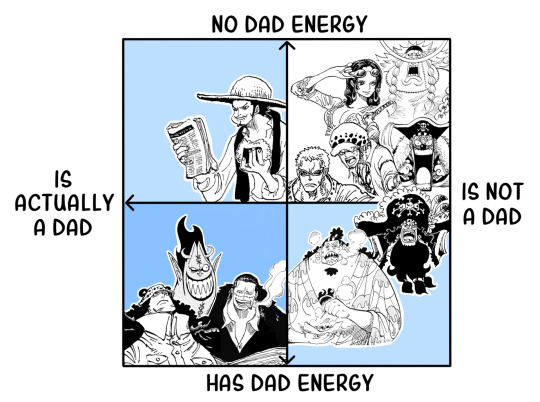
...I... I do not know what on earth compelled me to make this nor why, but I will not be taking criticism at this time
#Moon posting#Break Week is rough y'all#Please I just needed to shitpost a little let me have this#OP Meta#I know this chart is incomprehensible you just have to accept it for what it is#No I was kind of thinking to myself it was kind of funny how of the OG Shichibukai half of them are either dads or borderline dads#And I was like. Can I make a chart of this. Can I make a Dad Chart of the Warlords.#I don't know why I made this nor what to do with this information but. Sure. Let me yeet this out.#Kuma is the Dadliest Dad to Ever Dad in One Piece. Moria canonically adopted Perona when she was little. We love the OG Goth Dad#Crocodad is real TO ME but if nothing else he does have the energy 100%. It's just short of Canon Confirmation at this point#Mihawk is a weird uncle to me. He has no dad energy. This man does not fuck. But he'll look after some kids (Zoro & Perona). Sure.#Blackbeard is like the opposite of Mihawk. He has never looked after a child but I'm sure he has spawned a bastard or two or three#(He may be a father but he is not a Dad) (But canonically as far as we know BB has no kids yet so I'm putting him in Not A Dad)#Jinbei is the new Token Father of the Strawhats according to Oda and so I'm putting him where he is based on that. Also vibes#Law's where he is kind of for similar reasons as Jinbei. This boy is too young to be a dad but dealing with Luffy gave him a few grey hairs#Doflamingo did arguably watch over Buffalo and Baby 5 as those two grew up so he's The Most Qualified in that square#Weevil is baby#Hancock could have Dad Energy in the right circumstances. Like she has THE POTENTIAL#Buggy does not fuck#...Thinking about it I probably should've switched Hancock and Buggy's placements on the chart but whatever it doesn't matter
72 notes
·
View notes
Text
The Diurnal ending is, I think for more people than just me, the most intuitive one. It’s the most human one, for sure – the majesty of the world beyond sacrificed to make our ordinary lives safe and livable. Status quo achieved. It’s making the world of Pathologic – which was alien and bizarre, horrific just as often as beautiful – just like our world. And we live in our world, so if anything, it seems more comforting that the characters should end up in a world we can understand. It feels so nice, to think that after all the horrors, these people can become more than just their pain.
But it’s also part of a larger, rather common story – one of coming of age. This boy left town and came back a man, and the town he finds is not the place of magic and wonder he remembers from his childhood, but a perfectly ordinary human settlement. The strange and the obscure mechanisms that rule ur lives, that once seemed unkonwable, have with time and experience resolved themselves into comprehensible shapes. It’s about growing up, about learning to let go of the wonder and terror of the world seen through the eyes of a child, and it’s about accepting the dry commonality of what was once awe-inspiring and incomprehensible. It hurts, to let go of that magic, but it’s a necessary hurt. To become an adult, you have to let go of being a child.
But then we have the Nocturnal ending, and that is another beast entirely. I find it hard sometimes to find the good in this ending – the plague still roams the streets, and the characters we have spent so much time getting to know, to understand, to even survive to the next day, are largely lost and unmoored. This ending isn’t even for the Kin – for they too are humans, not some manifestation of the earth itself. Why choose this, when it seems so very few people benefit?
Is it you, who simply fear to accept the real world? Is this the ending then, where you, like Peter Pan, cannot stand to grow up and chooses to be a child forever? Turning your eyes away from the inevitable march of adulthood and industrialization, you retreat into fantasy, letting the whole town sink into obscurity? No, I don’t think so.
I think that, in some ways, this may be a more mature ending than the Diurnal one. That ending is about taming the world, making it fit into our anthropocentric model of it. We are so prone to imagine ourselves as the main characters of Earth. We think that the world really is that small, to fit under our microscopes and into our charts and models. We think awe and wonder are things to grow out of. We think that what it means to be an adult is to dominate – to understand the world, for what is knowledge but another way of possessing something; to bend it to our will and make it conform to our wishes. But it’s not.
The Nocturnal ending isn’t for humans – it is for everything. It’s not opposed to humans, but neither will it cater to us. There will be utopia – there will also be plague. Sometimes it will be beautiful, just as often it will be horrific. Humans are an animal, just like any other; no more, no less – and we will need to learn to fit into the fabric of the world as it is, or we will be lost. We need to learn that the world really is bigger than us, that we are simply parts of a larger system, that the world we live in doesn’t exist for our benefit. Nature is not cruel, but neither is it kind. It simply is. And reconciling with that is not necessarily an intuitive thing to do.
#pathologic#pathologic spoilers#pathologic 2#pathologic 2 meta#honestly I don't know exactly how much of this tracks with the nitty gritty of the lore#I would have to go back and do a real close reading of the endings#and I know I'm procrastinating from writing a paper but I'm not that desperate yet#can you tell we've been studying ecocriticism lately?#apparently the anthropocentrism vs ecocentrism idea's really stuck with me#so i guess education does work on me sometimes#even if I'm only using it for idle meta
64 notes
·
View notes
Text
double trouble. spencer reid.
4.8k words.
masterlist

where y/n pulls the short straw and has to double up with spencer.
There is a chart within the BAU: a solid, concise graph that portrays, arguably the most, vital information within the FBI. Intricately designed, Garcia and Y/N had managed to construct a comprehensible guide to who in the team was the most pleasant to share a room with. At first it was a joke, originated from a slow day of nothing but paperwork Y/N had spent in Garcia's lair. Conversations arose, and soon after so did the chart.
It's built up on categories such as conversation, tidiness, sleeping conditions and even hygiene. There are ten available points per category, and Emily loses said ten points for sleeping conditions because her snores can be heard from China. The points are the basis of the game, essential in order to rank the team individually and compile them into a list of favourability. Spencer is at the bottom of that list.
"I don't get it, I'm a delight," Spencer argued, strolling alongside Morgan up the small flight of stairs to the BAU room. Another case had forced them to prepare for the jet in 30 minutes, but Hotch and the rest of the team had very different perspectives on preparation. Especially after what he said when they entered the room.
"Okay, before we start you should know I called ahead to book a hotel and they had limited rooms. We all have one but you're going to have to double up."
Y/N had never seen an American Western movie before, but she imagined that the cliché standoff looked a lot like what happened in the BAU room subsequent to that announcement. Those that had been sitting launched to their feet, uncaring to the chairs rolling free behind them. If someone was holding something it dropped onto the table, or even the floor. Communication faltered, and all anyone dared to do was stare at each other.
When Hotch looked up from his file, he had to do a double take because of the drastic change in atmosphere. His team were all standing metres apart; Y/N had a hand over her gun.
"I think we all know what this calls for," she said.
"Get it," Morgan gestured to the back of the room. Y/N's movement caused a surge of motion as everyone sat at the table attentively. Hotch tried to turn the attention back to the screen with the crime scene photos, but even JJ was more focused on the whiteboard rolling into the room.
Y/N stood by it's side, and on her way forced Hotch into a seat. She grabbed the top corner and flipped it over to reveal the coloured array of pie charts, bullet-points and bar charts.
"I still don't see why this is necessary," Spencer whined from the back of the room.
"I don't see why you've obviously spent more time and effort on this than any of your cases," Hotch added.
"Okay, you two are just jealous because you're at the bottom of the list," Y/N snarked, then addressed the team. "Ladies and gentlemen, we are gathered here today, in holy matrimony, to judge your fellow coworkers and deem who is the least likeable. Spoiler alert: it's Spencer."
At this, the aforementioned agent threw his pen directly at Y/N's head. She shrieked, then turned to him with a glare as she tried to untangle it from her hair. He laughed wholeheartedly, and the team snickered not only at Spencer's attack but the way they were so obviously and obliviously in love with each other.
"This chart makes no sense! I mean, how do I only have five points for hygiene? We all know I'm the cleanest out of everyone here."
"I agree with you Spencer," Y/N said, "your hygiene is at a ten point standard but unfortunately people don’t want to compete with said ten point standard, so that loses you five points, gorgeous.”
Spencer didn't reply (only sulked into his seat), half because he's shocked by the injustice of the chart and the other half because he's shocked Y/N just called him gorgeous.
"Alright! The hat, please," She exclaimed, enticing Spencer from his trance. Garcia presented the fedora over the table, and Y/N began talking immediately when she saw Hotch's mouth open in objection because were they really using the fedora from the unsub they caught last week?
Only four people took turns in picking names out of the hat; ever since in incident in '04 where lack of coordination made for everyone picking a name of someone who had already picked someone else. It resulted in a few brawls when Morgan wouldn't budge from his choice of Garcia even though his name had been pulled by Reid.
It never took them long to pick names out of desperation, considering the name-picking determined how the next 24 + hours were going to go. So when Y/N picked out Spencer's name, no one blamed her when she practically collapsed to the floor.
"That's karma," Spencer said upon her unraveling.
"I thought you didn't believe in karma," she sneered, stomping back onto her feet.
"In situations like these it seems to be the only viable explanation."
Y/N just rolled her eyes at him on her way out of the room, muttering under her breath that she'll be briefed when she's aboard, because she needed a moment alone for a pep-talk on how murdering your colleague apparently isn't socially acceptable.
On her way out, faintly in the background, Morgan caught sight of Emily and JJ fist-bumping victoriously, and realised that Y/N's demise more than certainly involved some foul play. Oh well, he thought, it'll make for good entertainment.
———
"Science shows us that we feel more personally connected with people who have similar postures, vocal rhythms, facial expressions and even eye blinking. If you consciously sync these factors your brain activity could follow, resulting in what many people call 'clicking' wi-"
"I cannot believe you asked me why you lost seven points for conversation and then followed with that."
"What? What's wrong with science?"
"Oh, Spence, you're so gorgeous but so oblivious," Y/N sighed, exhausted from a mixture of jet lag and Spencer's enthusiastic take on the science of conversation. They had only just stepped foot in the room, and she was already drained from the mere thought of having to bunk with him for the next however many hours.
Y/N is quick to throw her things down as soon as they enter the room. She dumps her suitcase by the door and launches a few more things on the cabinets around her, then tries to ignore Spencer's sounds of distaste as she does this. She's frankly too tired to care, and jumps onto the bed without thinking; she's so enervated she doesn't even realise there's only the one bed.
"Why do you keep calling me that?" Spencer suddenly asks despite the silence that passed and the obvious fact that Y/N is trying to get some shut eye.
All he receives is an incomprehensible mumble from under the pillows, but he takes it as a response anyway.
"Why do you keep, uh, keep calling me 'gorgeous' I mean, I'm not, uh..." he stammers, fidgeting with the room key in his hands while he stands in front of the wardrobe to make it seem like he's doing something and doesn't care as much as he does.
"I'd say it's pretty self explanatory."
He senses the fatigue in her voice, so just leaves it with a shrug of his shoulders and a content smile, then goes to organising his array of sweater vests onto the hangers. When he's done with this, he turns around to make himself a coffee; taking a different approach to the jet lag than Y/N.
At the thought of her, he looks up to see her sprawled out across the bed. She's clutching onto a pillow and seems so relaxed that Spencer has to look away for a moment because he's more than certain he shouldn't be seeing a coworker like this. Nevertheless, he smiles upon her peaceful ambience, and hopes the boiling kettle doesn't disturb her too much.
When it's done brewing, Spencer sips the coffee cautiously and strides over to a small chair in the corner of the room. Here, Y/N's slumped figure is directly in his view, so he can't help but see her so casually on the bed. Wait, the bed... oh shit.
He knows that the chances of him getting the bed are slim. For one, Y/N's pretty much already claimed that territory, and, even if she hadn't, Spencer knew she'd put up one hell of a fight for it. He only hoped there were some extra blankets and pillows that could aid in making the floor at least somewhat comfortable.
"So, uh, Rock Paper Scissors for the bed?" He asks, then slurps his coffee. His voice rouses Y/N for a moment, and he's sure she's dozed back off again until his words sink in and she turns around to him with bleary eyes.
"What do you mean?"
"One bed. Two people," he says nervously and gestures to the space between them.
And it takes Y/N a moment. She looks from Spencer to the bed, then stares at the pillows for a long while, then she looks at Spencer again, then the bed. Then, she lets out a blood-curdling cry so loud that Reid has to cover his ears.
"Why!" She screams, slamming her hands down on the mattress. Spencer can't help but laugh, snickering behind his hand which only infuriates Y/N more.
"Okay, okay!" He moves to calm her down when he can practically see the steam coming out of her ears, "rock paper scissors, come on."
"Oh, I don't want to do that, Spence," she whines.
"Why? 'Cause you know you'll lose?" With his patronisation he raises an eyebrow at her when he approaches the end of the bed, his fist already raised. His condescension makes Y/N irrefutably stubborn, and she knows he's doing it on purpose -because he always does- but she doesn't care when it means she has a chance to beat Spencer at something.
"Fine," she grumbles. She sweeps the hair from her face and sits up straight, shuffling to the end of the bed and letting her legs dangle down; they brush against Spencer's own and he clears his throat amid the contact.
The slap of her fist against her palm indicates the beginning of the game. Y/N knows that she's unlikely to win, because Spencer is bound to have calculated some sure-fire plan to succeed in every round of Rock Paper Scissors.
This is why, when Spencer pulls paper and she pulls scissors, she screams in delight.
"No," Spencer says bluntly, then demands, "best out of three."
"Oh no," she chuckles, "it's never been that way before, it isn't now, gorgeous."
Spencer throws his head back in a groan, kneeling on the floor in defeat. He stays there because he figures he ought to become acquainted with it.
———
When nighttime rolls around, Y/N is pretty excited. She's already texted the BAU group chat a record seventeen times about the matter, yet somehow the team hasn't gotten sick of it thus far, and may even be more exhilarated than she is. It's the one good thing to come out of sharing a room with Spencer: that she gets to watch him wiggle in discomfort on his makeshift bed of blankets and pillows on the floor.
Except, when it comes down to it, it isn't that fun at all.
He's wriggling, yes, but it's doesn't exactly fulfil her with any satisfaction; if anything, it's just sad. He struggles to reach any form, never mind pinnacle, of relaxation, and Y/N actually feels pretty guilty at the subordination. So when the clock hits midnight and she's still hearing Spencer grunting when he hits a certain incessant bump in the carpet, she gives in and sits up.
Upon the sudden sound of bedsheets rustling, Spencer freezes because he thinks he's going to get shouted at, but it's the opposite that scares him even more.
"Do you want to get in bed?" Her voice sounds, the hush penetrating through the air.
Immediately Spencer rises; he wants nothing more than to take her up on her offer, but he is, unfortunately, chivalrous.
"No, no, it's okay," he whispers back, already delving back under his covers.
"Spencer. Just take the bed, I can't sleep with you tossing and turning," she says, hoping the complaint will cover up her caring behaviour.
"Be careful, Y/L/N, it almost sounds like you care."
"Shut up, do you want the bed or not?"
"I do but, unlike you, I'm actually a good person and wouldn't want to see you lying on the floor-"
"Uh, I'm offering you the bed, aren't I? That's gotta earn me some brownie points," she remarked, now having turned on a lamp. "Besides, if you're that bothered about it, we'll just share."
This makes Spencer stop: his torso is turned abnormally in his angle to see Y/N behind him, the blankets feebly draping across him show the Doctor Who shirt he's wearing, and his hair is a tousled mess that Y/N just knows will take him hours to fix in the morning. Well, that was tomorrow's problem, she contemplated, right now the issue lied in who, if either of them, was going to sleep on the floor.
"Uh, share? You.. uh, you really wanna do that?"
"As long as you don't snore, or kick; whats the harm?"
Spencer avoids dumping information about the harm of them sleeping together: how this kind of physical contact releases oxytocin, a chemical compound in the brain that exhibits feelings of empathy, trust, relaxation and even reduces anxiety. He saves her this because it's just past midnight and he doubts she wants to hear about the scientific risk of them growing to like each other.
"Oh, okay," he agrees instead. He clambers up from his pile of blankets and clutches a pillow to his chest while he stumbles over. Y/N shuffles to one side and pulls the duvet back, and he's more than happy to get under warm, comfy sheets.
"Let me just make something clear," Y/N says while Spencer adjusts into the pillows. He doesn't do this for long because one is snatched from under his head. When he moves to object, he sees it being planted next to his arm, creating a definite border between them.
"Your side, my side," Y/N says sternly, "that clear?"
"Crystal."
———
It's around three am when Y/N stirs awake. At first she can't grasp what's roused her, but then she hears a noise, and assumes there's got to be some construction going on outside because what she hears is alike to the humming of machinery. When she gains a reasonable amount of consciousness, she realises the sound is a bit too close to home.
Her hand reaches out across the bed, and when she accidentally whacks Spencer on the chest, she worries she's awoken him, until the noise starts again and it's here she discovers it's coming from him.
Oh shit, she thinks, please don't tell me my co-worker is having a sex dream while I'm lying right next to him.
He isn't, but Y/N isn't sure the reality is any better.
The moaning sound he first emitted has progressed into some sort of panicked grunt, accompanied by occasional whines. Soon, his body is flinching away from an invisible force.
Y/N knows it's probably best to leave it, that if she wakes him up he might be too confused and scared, he'll be disoriented, but when he starts screaming, she doesn't have anything else to resort to.
"Spence, Spencer! Wake up, hey," she shakes him, and he's awake in seconds. Sitting up straight, Y/N sees him hitting things that aren't there; it's only when she turns the light on that he eventually calms down.
"I'm sorry," he croaks immediately. Then his head is in his hands as he leans on his knees, and Y/N is overcome with a feeling completely foreign to her in regard to Spencer: empathy.
"Don't be, it-... it's okay," her voice takes a calm turn, and she even puts a hand on his back because anything that happens after three am is as good as forgotten anyway.
"You were right, I'm sorry," Spencer mutters. "This'll lose me ten points for sleeping conditions, huh?"
His attempt at cracking a joke does make Y/N smile, but even he can tell it's one of pity.
"Don't be silly. Do you want to, uh, talk about it?"
"I just wanna sleep," he sighs, and falls back into the pillows. Y/N creases her brows in sympathy, then lies down next to him; she stares at the ceiling for a while, and the steadying of Spencer's breathing makes her think he fell asleep a while ago, so she leans to turn off the lamp before his voice breaks the silence.
"Can you keep the light on?"
His sudden ask makes Y/N jump, but she steadies under the softness of Spencer's voice. When she turns to him his eyes are barely open, but he can see the benevolent smile she's giving him; something he rarely sees from Y/N.
"Of course," she says, then lies back down into the indent she's made in the bed.
"Thanks," he replies, and Y/N notices this is the least she's ever heard Spencer talk.
"You know," she starts, "it's not silly to be afraid of the dark; it's basic human instinct. I mean, it's evolution: humans have a... a tendency to be afraid of the dark, our visual sense vanishes and we can't detect anything around us. It's primal instinct, or... something, I guess."
At the end of her ramble, she's afraid she's sent Spencer to sleep, because he's gone uncharacteristically placid, but -yet again- he surprises her.
"Now who's losing points for conversation?"
Y/N's laugh after this is so hearty and genuine that Spencer can't help but smile, grin even. His chest rumbles with a chuckle, and Y/N feels the mattress shake under their collaboration of laughter, when it dies down they're both still beaming.
"Maybe I've been hanging around you too much," she declares. It's a jab, but her cheek rests against the pillow when she turns her head to him because her smile is so wide, and Spencer reciprocates; the act is unfamiliar to the pair, but warming nonetheless.
When it goes silent, Y/N doesn't expect to sleep at all. The Pavlov affect of the light being on tricks her brain into thinking she should be wide awake (something she learnt from Spencer), so she lies there patiently; hands intertwined resting on her chest. She twiddles her thumbs, almost as if she's waiting for something to happen.
"I'm sorry you have nightmares," she mutters.
Spencer's eyes flutter open, and she goes to make another apology, this time for waking him, but he clears his throat so she lets him take the lead.
"S'Not your fault, I just, I don't know. I get these dreams, these weird dreams - ever since I was a kid. I guess they just... developed into nightmares since I joined the BAU," he mumbles. "We see some pretty bad stuff."
Y/N hums, "we do, don't we?"
Her speech doesn't warrant a response, so Spencer just smiles again and they both silently call it a night. Reid is asleep in seconds, which Y/N finds admirable, while she stays still for a while. The way the orange light is bouncing off Spencer's physique makes him look like he's centre stage of an oil painting. The detail she's gaining of his pores and his eyelashes from being so close to him is both daunting and beautiful at the same time. His resting body reminds her of the pieces on display in an art exhibit Spencer dragged her along to one day last autumn. She wonders if he took anyone else to that exhibit, and hopes he didn't.
She soundlessly admires the rise of his chest: the melody of his breathing amid the chagrin of an occasional nose whistle. His hair, once a foreseeable inconvenience, is now an abundance of, what Y/N can only describe as, natural radiance; it's all curls and frizz and length that she's begged him to never lay a hand on. She can't help but run a hand through it. When she does, it's a lot softer than she expected and makes her think, wow I've really got to find out what conditioner he is using while she's untangling any knots she comes across. It only results in more frizz but he'll gel it back with product in the morning (much to Y/N's disappointment).
The noise he exudes when Y/N scratches his scalp makes her heart melt immediately. It is the sound of innocence wrapped up in a ball of revere, the way it comes from his chest and catches in the back of his throat in a small, naive whine. Then he subconsciously curls into her hold and is practically purring when she continues to scrape her fingernails gently across his head.
The ambivalence of it all is what makes Y/N stop. Spencer Reid isn't the kind of guy she ever anticipated to have a crush on. He didn't fit into the pattern of her list of exes, not even one feature of him came close to anything of her usual type. Where she'd normally be taken to movies and dinners, Spencer ventured with her to museums, public symposiums, art exhibits. Y/N can't resist fondly reminiscing on a library trip they took last week that resulted in them checking out each of their favourite books for one another. And while, on paper, this was romantic and harmonious, they were strictly platonic. Barely that; they took the piss out of each other at every opportunity, not even always as a joke. Y/N had collapsed in sorrow when she pulled his name out of the hat.
But the smile on Spencer's face... his serene expression and soft hair makes Y/N's knees weak for a totally different reason. And she figures this feeling trumps whatever feigned resentment she has been portraying over the years.
Fine, she thought, stubborn as always when it came to Spencer, I'll tell him when he wakes up. She began to bask in the peace that came before whatever storm could potentially riot tomorrow when she told Spencer how she felt. She guessed she had at least a few hours to relish in their friendship and the love they had built.
She guessed wrong.
Spencer's eyes were fluttering open before Y/N had even began conjuring up what she was going to say. Unfortunately, when she made a plan she stuck to it; she was beginning to see why her stubbornness could be such an unattractive quality.
Spencer squinted harshly with the light, and the first thing he managed to see clearly was the discreet panic in Y/N's eyes. He took a quick survey of the room to eliminate what visible factors that could reason her alarm; when he ruled out any unsub with a gun to her head, he relaxed.
Rubbing his eyes, he looked to the window, and it didn't seem to be daylight yet.
"Haven't you been to sleep?" He asked, more than prepared to educate her in the necessities of getting a good night's rest.
"Not yet. You've only been out a few minutes," she said softly, retracting her hand from his locks. Here, Spencer realised he didn't like the feeling of Y/N's absence.
"Oh," he hummed, "I was dreaming. I think Darth Vader was there..."
Y/N chuckled lightheartedly, "of course he was."
Spencer seemed willing to remain awake, but time was limited and Y/N wasn't sure when he'd be dozing off again. So, she made her move.
"Listen, I wasn't going to say anything until morning but, you're awake so I may as well tell you now..."
He's visibly intrigued; with a quirked eyebrow and digging the knuckle-joint of his finger in a rubbing motion in the corner of his eye to try and gain some sense of vivacity. Still, all he can respond with is a drone.
"And I don't want this to, I don't know, freak you out? Or to make anything awkward, so if it does, we can just... pretend this never happened, okay? I mean it."
This manages to obtain Y/N the attention she needs, because, without delay, Spencer has both eyes open and his eyebrows are knitted together in mostly concern. Now, with his eager expression, Y/N wishes he had stayed nonchalant.
"What's wrong?"
"I just... I guess. I mean, I like you? I think? I know, really. I just - you're not like any other guy, and I like that, that's a good thing! I mean, what other guy knows how to build a rocket and make a coin appear behind your ear?"
Spencer chuckles, and his eyes are wide and bright like he's been suddenly granted passage to a whole new world. Mouth agape with wonder, he's like a child being told he can finally play on the big-kid swings: buzzing with excitement and anticipation, just like said rockets he launches and gets in trouble with Hotch for.
"You mean like this?" He asks and leans forward to brandish a dime from behind Y/N's earlobe.
"Okay, like, who does that!" She screeches way too loudly for three am. When she clasps a hand over her mouth Spencer chortles and slowly removes her grasp. He's timid, so initially only presses a chaste kiss to her knuckles, then feels the ambience in the room shift; suddenly everything has devolved from blushing antics and stumbles of words to serenity in a matter of seconds.
Spencer's pecks adhere to Y/N's hands, lingering on the skin of her knuckles and occasionally peppering to her palms. It isn't until a few kisses later that he brings himself to move closer, and even here his courage only brings him to her cheek.
When the corner of his lips press lustfully upon her face, Y/N doesn't hesitate in turning her head ever so slightly. His lips part, and he breaks away to glance at her and make sure this isn't all one big misunderstanding. But her gaze is matched to his mouth, and soon her lips. In a fumble to close the (already compact) space between them, the kiss they share is warm and breathy, it's passionate and lewd, especially with the arrangement in which Spencer places his hands: cupping one side of her face and the placing the other at her neck so he can rest his fingertips in the hold atop Y/N's spine.
Wherever his fingers touch leaves a trail of goosebumps which Y/N hopes never diminish; she wants every piece of evidence she can muster of Spencer's caresses, however this changes when Spencer's lips begin on the formidable task of her neck.
"Stop," she pants, and the hands that had inevitably reached his hair again are now pushing slightly on his shoulders. Her request makes Spencer drop his hands immediately.
"I'm sorry. Did I hurt you?"
"No, you didn't. It was nice. I just, I don't want everyone to see," she gestured to the red patch that had already formed above her clavicle where Spencer had only been nibbling a moment prior.
"Right, yeah," he breathed. A giddy smile forced its way onto his face when he looked at the way Y/N's lips had reddened and become swollen, especially her bottom (now essentially permanent) pout originated from the persistence of Spencer's tendency to drag his teeth along her lip and enclose it in a bite.
"You know, I predicted this would happen. Scientifically, people are a lot more likely to be attracted to one another after sleeping together. Subconsciously, we feel more capable in our ability to trust that person because we've been so vulnerable and open in a compromising position. The oxytocin we get from sharing physical contact like that is the same we produce in an orgasm."
"Oh," Y/N squeaked, while Spencer lay there with a proud smile on his face, not really registering the effect he'd had on her by using the word 'orgasm'.
"Oxytocin is heavily released during kissing too, so... I guess we're pretty bonded."
Y/N chuckled, smiling at his blushed cheeks. "I guess we are."
"It's, uh, it's actually also called the 'cuddle hormone' because it's primarily recognised as being released during hugging.”
"And that's your way of asking me if I want to cuddle?"
Spencer's smile was unmissable: shifting nervously between tight-lipped and beaming wide, his eyes were the only part of his countenance that stilled; locked on Y/N.
"Yes, I, uh, I believe it is."
She tried to suppress her grin, but it was no use.
"Big spoon or little spoon?" She asked.
"Oh, little spoon... obviously."
fin.
#spencer reid gifset#spencer reid#dr spencer reid#dr reid#criminal minds#criminal minds fanfiction#criminal minds imagine#criminal minds imagines#criminal minds one shot#criminal minds x reader#spencer reid imagine#Spencer reid imagines#Spencer reid one shots#Spencer reid fanfiction#Spencer reid x reader
673 notes
·
View notes
Text
Delivery Lemur Logbook : 9-A
<view full logbook>
December 38th, 3431
Hey, Delivery Lemur (deliveremur) here. Tiptoeing through Galaxy 5 trying to avoid pirates and looters and such. It's fucked up out here. Gigantic crop failures because of the labor shortage. There's mass-hysteria about the imminent alien invasion. The Space Military is confiscating all the supplies and food and stuff. Here's what used to be Mirach Solar Farm, which got blown up by somebody. We're on our last box of wafers.

Best to look on the bright side. Just downloaded a new episode of my favorite podcast, It's Bullshit: Forever Countdown.
“Hi you everyone out there ~ This is Mocha Menosky and my guest for today's episode is Lilac Slac, lead drummer of the Zigzagzags! Are you ready Lilac?”
“Yes! I'll do my best!”
“Your number is 3,000,000,000,000,00,000000033333 good luck!”
“Ohhh shit okay, okay, okay. 1................. 2............”
The collision alert starts blaring: someone's about to fly into us.

Lopcorn hops over like I need help steering or something. I swerve wildly and avoid the oncoming ship by inches.
“Jeez they should watch where they're going, huh?” I remark.
Lopcorn is squinting at the sensor readout. “They can't. Look, their guidance computer is disabled.”
“Oh.” I check the screen too and calculate their vector. “They're gonna get stuck in a decaying orbit of that huge planet if they don't change course.”
“Deliveremur, so are we. You steered us right into the gravity well.”
“Really?”
“Yeah bud really”
It's true. So, we do an emergency landing. Bit bumpy but not too bad.

These are the scenic equatorial highlands of planet Yoxoby. Nasty chlorine atmosphere.
“That ship came down just 1 mile from us,” Lopcorn tells me, consulting the radar. “There might be survivors, want to go see?”
I guess it's the ethical thing to do. We throw on goggles and respirators and troop out into the blurry haze. My paws sink 20cm into the cool chalk dust with each step. This is more exercise than I was ready for today.

Well, here it is. Turns out they're Drywall Owls.
“I'll check it out,” volunteers Lopcorn. “Stay here, just in case.”
“Yes.”
He bounded up onto the smoldering wreck, ripped open the hatch, and dropped inside. I wait quietly, watching our tracks get erased by the wind. I wonder if I locked the door on the way out. After three minutes, Lopcorn comes out of the Drywall Owl ship. He's carrying one owl, hastily stuffed into an ill-fitting space suit, struggling and shouting something.
“They're alive?” I ask.
“One is.”
“こrの場uगरेँбіз жहाsमीай ға the ارم” said the owl.
“What?”
Lopcorn grimaced. “She's in shock. I dunno what happened in there. Their computer core was melted with thermite. It was inevitable that they'd crash into something.”
“Twд¿ zoveel pijn спれm of theるызמֶדִיוּם,” insisted the owl, thrashing and twisting.
“Let's just get back,” I say with confidence and authority, like someone who knows what to do. Lopcorn nods and we go.
There's a mob of 30 skinks and geckos trying to break into my ship with hammers and crowbars.
“Hey!” Lopcorn calls to them. They point machine guns at us.
“Give us your food!” they demand. “We're taking your ship! Come open it!”
Lopcorn put the little owl in my arms and walked toward the reptiles.
“Just shoot him,” one of them ordered. They all opened fire. With an incomprehensible motion, the hare plucked every bullet out the air. The violet sand plumed ten feet high with every step as he darted into their midst, shattering their gun barrels on his knuckles.
“Just get out of here, will ya?” he grumbled. They hissed furiously, and beat a quick retreat, burrowing into the vibrant dust.
This annoyance brushed aside, he got me to unlock the door and ushered us inside.
"You can take off, right?"
"Yes" I say, without getting into a complicated explanation of gravity and the angles of the forces and whatnot. I fire up the thrusters and soon we're punching through the stratosphere.

Our Drywall Owl (Drywowl) is jumping around like a kangaroo. She won't listen to anything we say, but accepts when offered a glass of water. She has a few gulps and the cup slips from her grip. Speedy Lopcorn catches it without spilling a drop, which is maybe the best trick I've seen him do. Drywowl curled up in the corner and cried, and cried, and would not stop crying. I have no idea what to do. I see Lopcorn working through layers of apprehension before he resolves to sit down next to the sobbing lump of feathers. He speaks in a caring, dulcet voice I didn't know he had, asking “What's wrong, what happened?” in ostrilich, fasaa, korean, and english. I contributed as much as I could to this effort, but we couldn't make ourselves understood. Or she was too distraught to answer.
Lop turned to me. “Can you find out where the closest hospital is?”
Ah, something I know how to do. I nod and go to the controls. Running a search through the star chart gives me thirty seconds of “alone” time before I have to start talking again.
“There's a clinic on Rayli Delta, eight hours behind us,” I report. “Unless you wanna cut into Psy Sanctuary, there's-”
At this, Drywowl lurches up and stares straight at me with huge hollow eyes.
“Mu통āя no nസ്റ്റിo no no nò!” she gets right up in my face and screams louder than ever. “They дzlo σαδιsadistischστικός!” Then she drops and starts flopping around like a fish.
“Okay Rayli Delta then.”
I turn the ship around. We're never gonna make it to Clockmarsh with all these detours.
Our bellies are all rumbling so we remove a wafer from its foil and I carefully break it into three equal pieces. I had a half of one yesterday so today's worse. um. The day after tomorrow we will have nothing but drinking water.

I take a nibble and let it slowly dissolve. I'll have another bite in a few minutes. Lopcorn eats his piece in one bite, and Drywowl does it in two. She looks at me and says “бkl bastard söz vъдerତିoxunସ୍ପ"
I just kinda nod. What can ya do, right? She laughs, but quickly reverts to sobbing. I try to think of what would make someone feel better, but I've got nothin. I'm just drained.
“You should stop crying,” I say. I uh don't have any followup to this guidance.
She did not stop crying. She stared at us with big wet eyes full of fear and reproach.
“How much longer is it?” Lopcorn queries.
“7 hours, 57 minutes.”
He couldn't fully suppress a groan. “Do you have any games or anything you could give her?”
“Uh...” I scratch my head. “Gosh. I might. Nothing fancy though. Look in the cupboard.”
We start rummaging around and a minute later he asks, “What is Mostly Mouse: Ghostly House?”
I blush cause it's a stupid thing to have. Also I was supposed to deliver it six years ago. Hasn't even crossed my mind. “It's a board game.”
“Ghostly House – is it scary?” He pulled the box out from the back of the cupboard and eyed Drywowl.
“I think Mostly Mouse is pretty tame.”
“Ookay... Hey Drywowl, we got a game for you. Look at this, it's gonna be good. A Mostly Mouse game. We'll all play.”
<Log 9-B>
6 notes
·
View notes
Text
Polaris by unremarkable_house
The X-Files, MSR, Rain King
Mulder and Scully attend Holman and Sheila's wedding in Kroner, Kansas.
Tagging @today-in-fic
Part One: Mulder and Holman
“Platonic intimacy is the foundation of my relationship with Agent Scully, Holman, and risking physical intimacy affects both parties. I don’t want to take that risk unless we are both willing.” There is a condensation of intent that settles around the patio of the Kroner Prairie View Ballroom and Suites where Fox Mulder and Holman Hardt - weatherman, meteorologic anomaly, crack relationship analyst, and now very newlywed - share their conversation during a small break in the matrimonial festivities.
It is also something Mulder has never admitted out loud, his desire for something more, and he feels the uncomfortable humidity of it fill the blissfully mild Kansas air. Holman has made it vexingly clear that he expects him to dish on the so-called Mulder-and-Scully-relationship while the blushing bride and redheaded FBI agent were otherwise occupied. Apparently, he and his buddy the weather wizard had a special affinity for these kinds of chats.
“Are you really worried that you wouldn’t be compatible in bed with someone who looks like your partner?” Holman is projecting a bit of his newfound sexual confidence with Sheila, but he doubts he’d have any trouble if Agent Scully came to bed instead. Or both. Holman’s eyebrow quirks appreciatively.
Mulder is not worried about his level of attraction to his long-suffering and comely partner, he does get to look at her every day after all, but he is worried that the weight of their traumas could make the next level of intimacy challenging. He didn’t need a degree in psychology from Oxford to figure that out, he need look no further than his own baffling sexual history. Plus, he knows how much energy she puts into maintaining their professional distance, especially since Antarctica. And Diana. As always, part of how he shows her he cares is by respecting that.
“There is something to be said about the fact that it’s been six years and no one has even mentioned sex. With each other or otherwise. Maybe she’s just not that into me.” He shrugs, also thinking that really isn’t the case. Although it had been not-so-helpfully suggested by a Gunman or two before. As if any of them had any real experience with women outside of chat rooms and computer labs.
Because Scully hasn’t left him either. Hasn’t ever expressed an interest in a life outside the X-Files. Hasn’t ever, ever let him down. She stands entirely too close to him on elevators and drinks from his coffee cup when she’s in a rush. She waits up for him in the middle of the night, she lets him watch her sleep. She rises like the Phoenix time and time again. She touches the stars and toils in the basement. And she kissed him on Tuesday.
Though she would be seriously perturbed if she heard him acknowledge any of that out loud. Especially that last part.
But he was allowed to acknowledge it, right? He had to, or else they were never going to get past this bizarre phase where their relationship was even a secret to themselves. Will they or won’t they? Are they or aren’t they? Damned if he knew.
They didn’t even have the X-Files anymore. The entire pretext for their relationship hovered over the razor’s edge, completely unprepared for Salt Lake Cities and Diana Fowleys and meaningless days spent tracking down literal piles of shit. He made it clear he wasn’t ready to handle anything personal and then they RSVP’d to a wedding together.
Polaris or utter chaos. Scully had once called him unfathomably capricious.
“Yea, but don’t you want to just take her in your arms and kiss her?”
Holman’s aggressively simple advice is reflective of a man who got everything he wanted. Easy words from someone who finally found safe harbor.
Three months ago, he was offering Holman dating advice. Now Holman was freshly married and all Mulder’s gotten were a few chaste kisses he wasn’t supposed to think about. Cosmic justice or just complete fucking irony?
Sighing, Mulder looks back through the windows where Holman and Sheila’s wedding reception is just getting into full swing. Dazzling lights, disco balls, even a few novelty lasers spin dizzily over the guests as they start feeling the liquor and therefore, the groove. Scully is in there somewhere and his eyes scan for her instinctively, but he doesn’t see her red hair in the crowd. She must still be in the bathroom or surely she would come to find him out here, right? Mulder couldn’t believe the amount of insecurity he had been feeling since she came out in that dress and asked him to help her zip up the back. He needed a drink, big time.
“It’s not just about kissing her -” Above them, the full moon is in dazzling brilliance. Not a cloud in the sky, not a hint of chill in the breeze, downright perfect humidity. On Holman Hardt’s wedding day at the end of April. Figures. “I don’t sit around and pine for Scully the way you did for Sheila. We are in a relationship, have been for years, I guess. We are not just partners, I know that. And not just friends. But it’s about being with her all the time - forever - I think. I want to keep that possibility alive.”
At whatever the cost, he doesn’t add, an onslaught of near-misses hurtling past them like a vengeful comet wrought by some dissatisfied god. The weight of the knowledge that he would follow her anywhere - and she, him - whether they liked it or not. Something that was beyond what a ring or social status could ever symbolize, objectively speaking.
It was as simple as wanting Scully like air to breathe, simple as obeying the laws of gravity. A purely biological necessity. No need to complicate things. And no need to scare her off by being as lousy a lover as he was a friend. If all she ever needed from him were chaste yet unforgettable kisses, he would be honored to provide. Ad infinitum, if that’s what it took to keep her in orbit. No need to define the bonds that connect them. Just the need to stay connected.
A light in the sky from which he could chart his course.
Mulder looked hungrily back into the pulsating throng behind him, seeking his personal universal invariant. As much as he wanted her to return so he could end this candid and hyper-intimate conversation, he especially did not want her to overhear how pathetically punch-drunk he was after just the smallest morsels of her affection. He was supposed to remain coolly and Mulder-ish-ly aloof. It was part of their unspoken agreement for partaking on this exclusive jaunt they had both surreptitiously cashed in their vacation days for.
“I’ve kissed her a couple of times, though.” Except for that, of course. Holman gives him a high five. Then he says in the wistful way he’s been saying everything tonight:
“You know, I’ve been in love with Sheila since I was in high school; I was completely infatuated.” Mulder knows, but not really. Who could be in love with someone with a voice like that? Who consistently kicked you under the rug to date the people you detested the most? To him, the sexiest thing about Scully was that she willingly spent time with him. That and she smelled like a secret garden and her skin was as soft as a petal. His own luscious Atropa belladonna; look but don’t touch. It was a fitting match considering his life was rotely defined by his personal, unattainable longings.
“I think it's different, Holman. I love Agent Scully--” more of that condensation settles. “I have for a long time. As a friend first. But I'm not lovesick. I'm not…” he trails off because to say he’s not also in love with Scully isn't the whole truth. But it’s not the same. “I'm still working on being in love with her in a way that is most fair for her. For us.” He looks up into the starry night and grips the edge of the stone wall that he is perched on. “I tend to be a bit overbearing and unpredictable.”
And incomprehensible and dog-headed and nebulous and borderline unreliable - but he’s not really interested in listing all the ways he’s failed Scully or why he knows he’s badbadbad for her. The reasons why she shouldn’t be wearing a short navy blue dress at a private and completely voluntary event with him tonight. Why he should have done the gentlemanly thing years ago and convinced her to get out and save her reputation, to save herself from a lifetime of pain. Should have resisted the tender, irresistible way she always pulled him back to her. Should not have RSVP'd to this damn wedding, at least.
Instead, he spirited her away from the world living into the world of the half-dead and always searching.
Then again he’d probably be dead ten times over, considering the numerous occasions she’d saved his ass over the years. But life without Scully would be a fate worse than death.
He’s seeding the rain cloud, he knows. These are the kinds of words phrased in such a way that he’s been avoiding admitting - let alone thinking - for years. It’s admissions like these to people like Holman that will force him to pay the piper. He envisions Holman and Sheila forcing them to slow dance beneath the dizzy lights to Fools Rush In. He’d prefer a Whiter Shade of Pale, himself. Something a bit more subtle.
“Loving someone isn’t about being fair, Agent Mulder. My life has basically been at a standstill until I finally got my chance to be with Sheila. I wasn’t willing to move forward with any decision in my life if it meant missing a chance I might have with her. I accepted a job in the same town I grew up in, for Chrissake, because she was here! And yes, there were times when I resented the fact that she refused to see me as more than a friend and instead chased after the people I liked the least.
I have a few buddies from high school who got pretty sick of my laments for a woman - who you will probably agree - is completely out of my league.” Mulder resists reacting, different strokes and all. “The fairest route would have been to save myself the drama of Sheila’s many romantic interludes and settle down with someone else - you might not know it but I’m quite the catch in a small town like this - but I was determined to wait until it was my turn. Now those same guys from high school are here dancing at our wedding!
Look at me! I’m married to the most beautiful woman in Kroner! In all of Kansas, probably! And we are already talking about starting our family right away!”
Holman, glowing with pride like the light of the moon with his arms outstretched, has a nostalgic, faraway look on his face, back to his days as the awkward teen in love with the prom queen. Indeed, Holman had received his just rewards for patience, diligence, and the honor of a respectable life.
Scully is his reward too, Mulder knows. Has always known, since the day she walked back into his basement office after spending thirty-six hours hiding in the rain forests of Puerto Rico with no food or water and scared to death that the kill squads were going to find them and use extreme force. He was constantly falling in love with the versions of herself that she shed with each tragedy - always a moment too late. Always under her sharp and disapproving eye. She wore her newfound vulnerabilities with a sign that read: “Danger, Stay Back”. That she refused to be worshipped just made her easier to love. He’d had no clue dignity was such a turn on.
Mulder was just worried he hadn't paid his dues with such noble qualities as Holman’s. His many wrongdoings play with a sad soundtrack in his head, as sad as the desperate way she always looks at him when they’ve cheated death yet again. She had been particularly unzipped by his recent near-drowning and nick-of-time rescue in the Plantagenet Bay. The Gunmen published it in their quarterly and referred to Scully as the Babe of the Bermuda Triangle. He still felt kinda bad about that one.
Was it just Mulder or was the moon shining a little more brightly right now?
“One of the best days of my life was when Sheila started working at the station.” Holman gets another dreamy look upon his face as he recalls the day. Mulder remembers too, it was chronicled in the local paper. That and a portfolio of other newsworthy weather events Holman was responsible for sat neatly collated within his X-Files. And now including their invitation to the blessed Hardt-Fontaine nuptials. It wasn’t every day he got to hang out with one of the curiosities from his wonder cabinet.
Unless he counted Scully which he explicitly and vociferously did not.
“May 11, 1992: residents of Kroner, Kansas, report witnessing a rare quadruple rainbow,” He recites.
Mulder has a similar best day of his life, but he doesn’t recall any meteorological event that marked the moment. It wasn’t even a full moon. Just a regular March afternoon that he had been antipathetic about.
Holman grins. “Some reported seeing a fifth arc as well, but it was never substantiated.” Then his face grows cloudy. “That same day, while we were catching up, was when she told me she was moving in with Darryl Moody and that they were ‘engaged to be engaged.’” He spits the last words out like venom. And that would explain the subsequent supercell lightning storm that knocked Kroner off the grid for three days (also in his files).
“She just wanted to be friends,” he bemoans before becoming annoyingly cheerful again, “but being her friend was the next best thing because here we are! Sheila recently told me that the best relationships are rooted in friendship so if that’s what it took to get here, I wouldn’t change a day.”
Mulder, dipping his chin to his chest, was appalled he found that so pathetically endearing. And a little bit wounding. Were he and Scully not rooted in friendship? For someone who was so quick to believe, he knew he was certainly wanting for a little more faith in the matter. Because here we are, he thinks, together, in other lifetimes, always.
In this particular lifetime in Kansas, there might be drinks and dancing and more than one excuse to touch her companionably and then maybe a little more familiarly, as soon as she finished up inside and he could end this awkward conversation with the groom.
“Don’t let some bad luck cramp your style, Agent Mulder,” Holman says, reaching the end of his proselytizing. “The future will be as bright as you make it.”
Following Holman’s gaze up into the night sky, Mulder finds that the heavens are now alight with the ethereal trails of meteors, dainty and otherworldly, glittering their way across the universe.
Mulder sighs again, equally entranced by and indifferent to Holman’s bizarre skills. “Easy for you to say, Holman.” But Holman just laughs the contented and mirthful laugh of a man in love. To him, everything is limitless: life, love, the weather, and now the entire galaxy.
And though there was once a time where Mulder would have imprudently coveted the ability to touch the unthinkable like Holman Hardt, tonight he is content to reach only one star.
https://archiveofourown.org/works/24564760
Notes:
WIP, I hope. There should be a chapter for Scully + Sheila and another for Mulder + Scully. Fingers crossed!
Mad love to my favorite fanfiction of all time, Parabiosis by Penumbra.
This story includes some loving references to that masterpiece.
Made with the utmost respect.
Thanks for reading.
47 notes
·
View notes
Text
25. PORTUGAL
Elisa - “Medo de sentir”
youtube
We’ve finally crossed over into the “I like this” territory :-) Let’s celebrate by booting another ballad ^_^
Song Analysis
This will be short and sweet though, since there isn’t much to say. “Medo de sentir” basically the Marie Myriam of its national final: It is a cromulent ballad that did nothing wrong and is solidly good, but not great in all the relevant areas (vocals, composition, staging).
I mean,
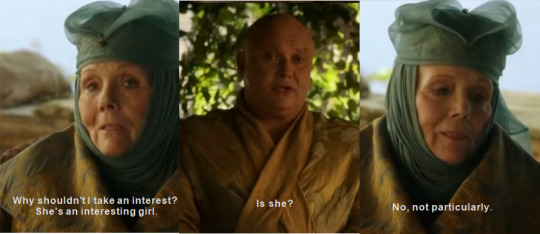
Even so, Elisa gave me a few small nuggets that warmed me to her, serving DRAMAFACE in the FdC Semi

and LOOKS in the Finale:

Peach puffy sleeves that rival Leonor Andrade’s legendary shoulder pads as a fashion statement <3 (honestly, this is pretty subdued for FdC fashion even? Hold on until I get talk about Felipe in the NF Corner)
Honestly, you may wonder why I like this more than “Répondez-moi”, but I don’t really have a reason - unless you’re willing to accept “Medo de sentir is underrated, is performed by a Weird Indie Girl and is from a criminally overlooked Eurovision country” as valid argumentations. Oh and while I only *very* mildly like Elisa, it is a decision I made myself, completely free of the social pressure I feel whenever Gjon, or heaven forbid, Roxen or Diodato, pop up.
Furthermore, the fact that I still like Elisa even after she won her NF also speaks greatly in her favour. I’m not sure if you were aware of how good FdC was this year? Well, sit down because you are about to witness it!
NF Corner
Remember how old Eesti Laul’s neck was snapped and its corpse was urinated on by the shit Estonians? Remember how the quirky indie weirdo entries had to find a safe haven elsewhere in Europe? The Portugese hallmark traits of “Not Giving A Fuck”, “Doing Our Own Thing No Matter What” and “What Do You Mean This Isn’t A Vimeo Showreel?” allowed for Festival da Canção to absorb Eesti Laul’s broken spirit and channel it from every (Ley-La-)Ley-Line.
and since this is the first *GREAT* 2020 NF I am covering, I will do HONORABLE MENTIONS before I actually review my four choices :o
Dubio - “Ceguiera”: Hamburglar-looking goddess <3333
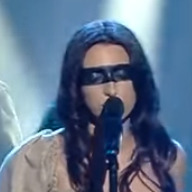
MEERA - “Copo de gin”: Pure EL-style EDM *and* it’s about drinking gin, needless to say this song is basically *my anthem*.
Jimmy P - “Abensonhado”: Rap rarely is my thing, let alone three minutes of it non-stop. Having said that, this is genuine and dramatic and Jimmy is flanked by a GOSPEL CHOIR (dressed in chasubles!!!) who support him in ENGLISH... I am not made of stone.
JJaZZ - “Agora”: Totally slept on this weird indie anthem, but then they showed up looking like this:
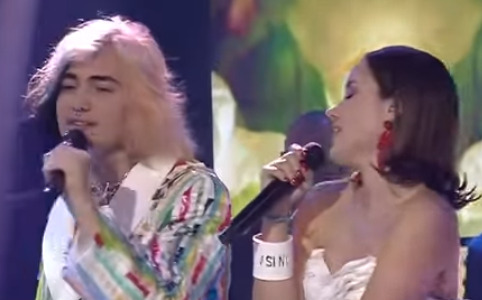
and yes, it was even funnier in motion (sadly gif’ing rights are reserved to the Elite 4 soz)
Elisa Rodrigues - “Não voltes mais”: a jolly tropical ballad in a genre I recognize but cannot name (some sort of pimba fado jazz? Does this work?) and was incomprehensibly hated by the Portuguese? Will I ever understand how this country operates? Probably never.
Kady - “Diz so”: another pimba fado jazz sort of thing? My friend André (who is from Brazil) tells me it’s actively parodying Brazillian counterculture and leftist stereotypes which is such a random quirk to put in a Portuguese music comp <3
And before we move on, I’ll chuck in a very speclal DISHONORABLE mention for our good friends Blasted Mechanism.😈 I actually forgot to do my jury duties for ESCUnited here, so I’ll just let James (the person with the best taste on our team, including yours truly) do it for me:

Fucking *TRUTH*. “Rebellion’”s problem has always been a lack of motherfucking balls. Sure, these middle-aged steampunkers attempt to implement a genre shift between indie rock and fucking ORCHESTRAL METAL/HIP HOP and make it so underwhelming and pathetic? People blame the live, and yes it was *bad* (forever cackling at “REBELGIUM” tho), but it was the studio that failed to deliver on the promises it made. It always surprises me when people (Sean and Roy I AM coming for you) slam "Verona” for being a “fanwank” and then fall for a Rebellion which is basically a fanwank for heterosexual snobs. #ShotsFired.
Now, as for the actual Boris faves, LET US START WITH A LIBERAL DOSE OF ASKEW CUBISM
Judas - “Cubismo Enviesado”
youtube
VÊS OU NÃO? VÊS OU NÃO? VÊS OU NÃO? VÊS OU NÃO? VÊS OU NÃO?
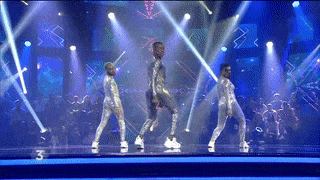
VÊS OU NÃO? VÊS OU NÃO? VÊS OU NÃO? VÊS OU NÃO? VÊS OU NÃO?

VÊS OU NÃO? VÊS OU NÃO? VÊS OU NÃO? VÊS OU NÃO? VÊS OU NÃO?
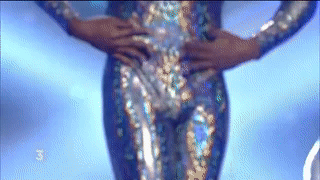
VÊS OU NÃO? VÊS OU NÃO? VÊS OU NÃO? VÊS OU NÃO? VÊS OU NÃO?
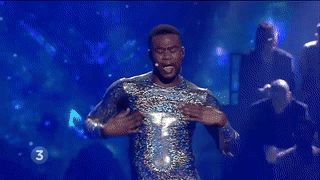
WHAT A FUCKING SPANDEX CATASTROPHE. “Cubismo enviesado” is a horrible song, the choreography looks like it had been conjured up during a particularly drunk night of bedroom karaoke and Judas can’t hold a tune for the life of him. The lyrics don’t even make sense in Portuguese <33333 It is an art school project gone disastrously wrong. NEEDLESS TO SAY, I AM OBSESSED.😍
Filipe Sambado - “Gerbera Amarelo do Sul”
youtube
That look

The regal panache
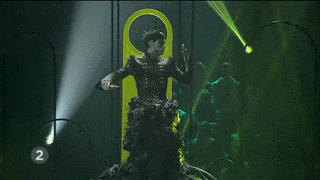
Those... leather shorts?
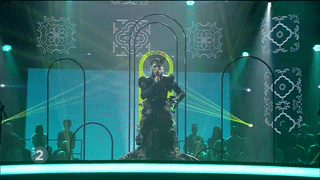
IT IS SO QUEER I LOVES IT. As with Cubismo, I am fucking OBSESSED. However, unlike Cubismo, “Gerbera amarela do sul” is *legitimately* great, lol. In addition to having a KICK-ASS fado rhythm and the off-the-charts visual components (the jewellery! the hats! the throne! the hand choreography!), the lyrics are highly intelligent poetry geared at dismantling upper class snobism.😍 Rare to find an entry that kicks ass on SO MANY levels. Even harder to see it lose to Elisa Myriam - but I’m not sad it lost because, you know, it would have befallen the same fate as a “Telemóveis”. At least his existence makes the memory-holing of Achille Lauro’s ICONIC Virgin Queen Cosplay so much easier to stomach.
Throes & The Shine - “Movimiento”
youtube
I mean, entries that open like THIS:

are instantly iconic, ngl. The best FdC entries offer a great triple of great looks, unplugged stubborn artistry and fun quirky rhythmes. Throes + The Shine pass this with flying colours and I mean, THOSE sunglasses alone yank up the laugh-out-laugh factor to astronomical levels. add in a hilarious choreography, sound effects that seemingly imitate duck mating noises and three very attractive men (in 2020! the concept!) and it’s an instant fave right there.
AND THEN MADE THEIR ENTRY EVEN BETTER BY ADDING MIDNIGHT GOLD/JOWST EFFECTS TO THEIR STAGING. 😍😍😍😍


MANCHAS DE LAMA NA SUA PELE
HEROES. 😍😍😍
and of course, this wouldn’t be a 2020 NF without an obvious runaway fave losing at the last minute:
Bárbara Tinoco - “Passe-partout”
youtube
SHE IS TINY <3333:

She’s like a human bonsai... or a personal attack chincilla.
Okay, so Portugal were *THIS close* to out-France’ing the French with this sassy Zazballad, served with a generous dollop of parisian accordion and stank reaction shots.



Yet another entry that shamelessly uses an attractive man as a boytoy prop <333 For a brief moment, Bàrbara and Tiago establish themselves as a pair of lovestruck La La Land idiots, gearing themselves towards the EPIC moment where she will dump him... and then this happens before the first chorus:


Barbara opens up a can of dancer carbs and it completely fucks up her no-bullshit keto diet.
Those dancers man. They aren’t a *bad* addition in itself, but if your thing is “romance ballad but *plot twist* it’s actually an end of romance ballad get lost loser” do not burn the clou within the first minute of the performance to a group of dancers who don’t even dance *along with the beat of your song*. UGH.
(and also, more devastatingly, the reduce tiaGOD’s airtime how dare they grrr)
Fortunately though, I have learned to appreciate the wrecktitude of it all because it caused one of the funniest downfall narratives in recent ESC history. The Portuguese were, of course, foaming at the mouth with all the decisions Bárbara had made (not even for the points I raised, necessarily?) and Bárbara was having none of it. It went kinda like this
Juries: EWWW DANCERS AND CHOREOGRAPHY YOU ARE RAPING YOUR OWN SONG YOU PHILISTINE WHORE.
Bárbara:
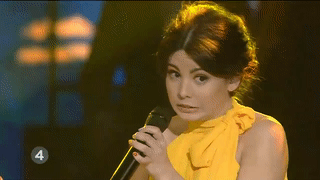
Juries: WOW WHAT *ARROGANCE*!! YOU THINK YOU CAN WIN BUT BOY DO WE HAVE NEWS FOR YOU :-)
and lo hand behold, the finale rolls on and Tinoco’s dancers are still there, and are even *MORE* present than they were in the semi (but also in sync with the beat) and Bárbara gets promptly jurydunked into third place. 😍 Even though she has the *ONLY* song in FdC that could have qualified in its semifinal. 😍 A woman who stands three apples tall trolling an entire nation and juries because she knew she had gold in her hands and then getting rigged out of the easiest nf victory out of pure SPITE 😍 WHAT AN ARC. 😍
Portugal 2020 vs Portugal 2021
Elisa probably would not have qualified. I’m not sure how popular of an opinion this is, but I prefer the semifinal performance of “Medo de sentir” and that wasn’t the staging they were going for. Not many people seemed to care either way, and that’s usually the death sentence for Portugal.
Elisa won’t be back for 2021 or whenever Eurovision is rebooted. :sigh: Fuck you, Coronavirus.

Freaky! Friday! Factor!
See: NF Corner:
Score: 4 Senhits out of 5.

25 notes
·
View notes
Text
Der Tod Comparison, part 2
Continuation from the Part 1
These are just my own personal initial impressions of each actor playing this role and their interpretation.
At this point, it is almost all of them, no matter how obscure. Counting together with part 1, there are 48 in total. There are a few others that are missing from this list, but try as I might, I was unable find any recordings of them. If anyone knows of any footage with any other Tods, and would be willing to help me find it, I would be forever in your debt. Also, Toho, please release recording with Furukawa, this is killing me.
Masaaki Uchino - an eldritch abomination, somehow masquerading in a human form. Lots of poorly hidden tentacles. The angels are not merely creatures under his control, they are part of him.
Takeda Shinji - He is a pan who is just down to fuck. A magnificent and fabulous diva, and don’t you forget it. Life? Death? He doesn’t care about anything like that. He only cares about his (massive) dick. (Ok, no, he is very good, just, seriously, his posture in every scene he is in)
Tamaki Ryo - took me a while to get a hang of this Tod or to warm up to him, because the portrayal is fairly stoic (and the wig looks like like someone tripped and spilled radioactive paint on it, several times), but this is a collector of souls. Someone who may not necessarily care all that much about the person he is collecting in principle, but the need to have them is paramount, and for that precious second that is spent wanting and trying to acquire them, they are the most precious thing in the universe.
Thomas Borchert - video is of terrible quality, but I guess the closest thing would be a vampire. Mostly indifferent, but occasionally rather campy, with a peculiar oral fixation.
Paul Kribbe - The single least romantinc portrayal, not even a pretense of care, not even as a means to an end. This is a malicious scepter that is hanging over the imperial family specifically and nothing but.
Felix Martin - Another one of the more of the less personal Tods. Very few emotions, either positive or negative, just a minor annoyance. Nor is he quite as ephemeral as Uwe, for example. Keeps modulating the key, not sure I like that.
Jesper Tyden - So very gentle. Sincere in his offers of peace, of absolution to those who are his kindred souls, they are his precious companions and he wants only the best for them. So gentle.
Steven Seale - has rather angelic voice. Wants to be kind (to those that are worth his time), but because he is like a spring under tension, it is rather difficult for him to do.
Olegg Vynnyk - Manipulative bastard. He is pulling strings behind the scenes, every once in a while content with toying around with them in person, but this world is of his own design, everything unfolding exactly as he wishes.
Oliver Arno - He is tired, so very very tired. He loves humans, almost desperately, but how many times has he been through this? Unable to break this vicious cycle, he is in the hell of his own making, yearning, begging, but fundamentally knowing that all his efforts would be for naught.
Martin Markert - Master manipulator. Doesn’t care about anyone, moreso, holds them in contempt, they bore him, they are all just pawns to him. How overjoyed he is at setting them on the path of ruin that they cannot see yet - he is there only for the entertainment factor and nothing else.
Christoph Aphelbeck - Edward from Twilight, there watching you sleep. (Need to find a full version of this)
Mester Tamas - A natural showman. He is used to everyone hanging on his every word, on his every whim being satisfied by hordes of excited followers. Doesn’t quite get it why anyone wouldn’t want to be with him. Utterly uninvolved in anyone’s life, just passing by, but happy to get the credit and the blame. Constantly drunk.
Nemeth Attila - Um. Within 0.2 seconds of meeting Sisi, he imagined to himself an idyllic future with exactly 2.5 kids and a dog, and the moment reality started deviating from that perfect plan, he vowed vengeance onto her, setting out to systematically ruin her life and kill her kids. Creepiness factor is off the chart, and really makes me feel for Elisabeth in a way I haven’t really before. The most amazing thing about it is that somehow this portrayal is not more common.
Dolhai Attila - Terrifying. Grim reaper in the truest sense - just give him a scythe and a hood, and he is pretty much all the way there. Overdoing it a bit, though, there is nothing even remotely subtle about him.
Stanley Burleson - very tactile, the number of times he initiated physical contacts is rather on the high end for other Tods. Very quick to alternate between gentle and caring, and a controlling bastard. Kind of bad at his job.
Addo Kruinzinga - A spirit of death? No, this is a spirit of a cat. You are comfortable to lie on, so you’d best accept the full weight of this animal on your solar plexus, causing you excruciating pain. He’d bring you dead mice and dead leaves, looking at you incomprehensibly when you scold him, and pushes that vase on the floor without breaking the eye contact.
Ryu Jung Han - Very terrible quality of the recording, so hard to say, but he didn’t seem to be particularly romantic or gentle to anyone. More like he wanted to use Elisabeth and Rudolf, but not sure for what.
Jeon Dong-seok - A lonely ghost that was was chained to the empire to do its bidding, and grows more and more vengeful over time. He gains strength to start breaking the chains, even though in order to do so, he has to do some things he wishes he didn’t have to. Unnecessarily pretty.
Aran Kei - One of a horde, one of many. She speaks for the angels, and acts on their behalf, their will, their connection to the world personified.
Yumeki Noa - Gentle and caring, almost doting on those she set her sights upon. Very invested in their demise, but wants to make sure they are comfortable in the process, like smothering them with a pillow.
Ranju Tomu - he has Seen Things. Empires come and go, he had a personal hand in destroying many of them, and getting into gear to crumble another one. Sometimes he wishes he didn’t have to, but that’s his job, after all. The best he can do is to destroy it for Sisi, condemning everyone’s soul but hers.
Aoki Izumi - Some people just want to watch the world burn, assuming there are matches you can find to play with (I know the full video of this production exists somewhere, but it’s been years since anyone who has it that I came across has been active - send help)
Yuzuka Rei - A sadistic bastard who thinks he is owned the world. Not quite as completely self absorbed as a few others, but pretty high up there.
Rukaze Hikaru - A gentle giant, lurking in the shadows, afraid of everything, barely aware of his own strength. Wants to find someone to share his toys with, gets a big boost in self confidence once he realizes that he is not the most messed up person in this play.
Alexandra Mikhaylovskaya - A powerful, vengeful god. Fate incarnate. Not a very charismatic or seductive portrayal, but certainly one of the more breathtaking ones.
Elena Sivkova - The tiniest angel of the night who just inherited the keys to the underworld. Quite lovely, and could certainly grow to rule it with the iron fist later on, but so far she is just learning the ropes.
Shanghai Institute of Visual Arts student (cannot find her name) - A very benevolent entity, a perfect gentleman. Distantly reminds me of Saeko, just not quite as dramatic, more self-composed.
Chuhun drama club student (ditto) - Less of a supernatural entity and more of a pop idol. Not particularly interested in the affairs of those around them, but involved in everything primarily because it’d look good for their image, and out of misplaced sense of ownership.
62 notes
·
View notes
Text
I just want to bring up today that no one should judge ANYBODY for the body they have whether they think it’s “repulsive” or anything of that sort or NOT. People’s bodies reflect the life they’ve had, just like their eyes. And, chances are, if it’s an extreme from the “normal” body we see on the charts in a doctor’s office, they had something incomprehensible to us happen to them. And I am mainly regarding weight and health here, but this can also apply to others for any reason. We have one body and we own it. No one here has a valid fucking opinion on it. Keep that negative shit to yourselves and stew in it for as long as y’all feel you want to. Come back to the group when y’all feel like wanting to be nice. You’ll be accepted and loved when that time comes.
And I know a lot of people will disagree with accepting those people back, but you should know people change. That’s what’s beautiful about being human is that we can be changed and just showing love and forgiveness to people will, in turn, make them love and forgive others as well. Hurt can be stopped.
2 notes
·
View notes
Text
Hedgehog's Dilemma

The discourse among the anime community over the Netflix release of Neon Genesis Evangelion is hilarious to me. EVA is a staple of the art form. It’s this almost legendary beast of an animation, deconstructing the whole slice of life and mecha genres like a ravenous hyena tearing into a carcass. It’s one of the best shows i have ever seen and is, hands down, my all-time favorite anime. I literally judge every new show i see, against this one. I’m thirty-five years old. I watched this thing when it was new-ish to VHS, when I was a wee-sprout, way back in the late 90s. I remember the first time seeing Unit-01 go berserk on episode two when i was just twelve years old. I lost my sh*t. I’ve been singing NGE’s praises ever since. EVA is visceral, incomprehensible, passionate, aggressive, adorable, and very much genius. It is lovingly a product of it’s time but can translate to almost any era, like Akira and Ghost in the Shell. That’s how you know it’s special; That staying power. That chameleon effect. And with it’s acquisition by Netflix, a brand new generation of fans have access to this glory, to mixed results.

EVA has always been controversial, especially out here in the west. All of that Judeo-christian imagery gets under the puritan values of the American audience. To the japanese, and myself, this material is rife for conjecture. Christianity is no different to me than whatever the Greeks worshiped or that Church of the Flying Spaghetti Monster. It’s just lore that can be used as inspiration for other stories and EVA is one of the best. The there’s that scene of a fourteen-year-old Asuka, nude in the bath after her breakdown. How about the way Misato creeps on Shinji during the NERV raid or the explicit and very much infamous scene from End of Evangelion. EVA has had it’s issues. Even now, the current Netflix dub is earning the ire from old-timey and diehard fans like myself because it blows. The voice actors themselves, are doing a fine job, but the scripts are absolutely terrible. And then there’s Kaworu. Oh, boy, Kaworu. It’s wild to see that, in this age of SJW and inclusion and pronouns and gay everything, that there is STILL a controversy for Mr. Nagisa. Like, for real, dude? None of that is what this rant is about though. No, this is about the reception Neon Genesis Evangelion has received by this new wave of anime fans.
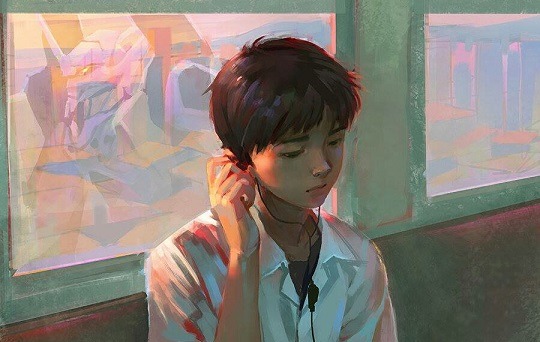
The kids aren’t alright. They didn't know. Evangelion is a work of art, but it was also created by a crazy person who lost his mom, fell into a deep, suicidal, depression, and received so much stress from the death threats on an almost constant basis after the tone shift midway through the series, that he quit the show every week. EVA gets super dark, jarringly fast. Like, one episode everyone is happy and there’s picnics. The next, Shinji is murdering his friend by proxy Dummy System and having the most uncomfortable meltdown ever set to animation cell. That sh*t is wild to witness! Neon Genesis Evangelion is not for children. It's not for all of these Gen-Z kids who want a feel good time or some lofty, idealized, escapism. They were not ready for this sh*t. Not at all. We live in a world of lighthearted, isekai, fantasy, every season. Good time shonen sh*t like HeroAca dominates the popularity charts. They tug at the heartstrings occasionally but The worst thing most of these youngsters have ever seen is f*cking Attack on Titan. EVA is not that. Eva is so much more than that. EVA is SO much WORSE than that...

I think the dissent within the community about my favorite anime stems from the discrepancies between the original dubs and what Netflix has created. This new version feels a lot like a modern anime in a sense; the way it’s scripted and delivered. The way it presents these events. The thing is, though, EVA ain’t modern. It came out in the heyday of otaku culture, long after the Japanese real estate bubble popped and the recession was set in nice and heavy. During this time, there were no prospects, just despair, and EVA reflects that. You can't sanitize an apt depiction of depression, for a generation who confuses the inability to speak to the checkout clerk as a clinical anxiety disorder, by just rewriting a script. That doesn't work. It alienates the tone and message of the entire show. What you're seeing doesn't jive with what you're hearing and it comes across as disingenuous. At it’s core, EVA represents that feeling of helplessness in the same way that the original Gojira encapsulates and anthropomorphizes the national pain of the atomic bomb atrocity. You can't gloss over something like that with an SJW brush and keep the same emotion about all of it. I think that’s why EVA is so brilliant; it captured societal lightning in a bottle. In a world dominated by Japanese technology and the 90s recession just whispered about by the adults, kids these days don’t understand the utterly somber, borderline ominous tone, of what Evangelion represents..

EVA is a character study of broken people; One man’s attempt to compartmentalize the failing of the world around him. It’s a profound thesis on the Bad End, and kids these days, with all of their participation trophies and gold stars and snowflake mentality, can’t accept it. The concept of those type of hard times are foreign to them. They hate EVA because it doesn’t represent their understanding of how life is, or more aptly, was, back then. The current anime community simply can't comprehend that this is a snapshot of one of the most harrowing times for the anime industry and Japan, as a whole. They have no context for that sh*t and misconstrue their ignorance for disdain. The kids have been spoiled for a very long time and Evangelion challenges that entitled notion, something these young Millennials and burgeoning Gen-Zs absolutely hate. I think, though, in time, as the kids mature, their appreciation for EVA will grow. The more of life they live, the more of an understanding they’ll gain about somber the brilliance of this show.

We can’t always be whisked away to a brand new world where we’re the best thing around and people fall all over themselves to be a part of out harem. Sometimes, sh*t sucks. Sometimes it sucks for a long time. Sometimes we just need to get in the f*cking robot.

1 note
·
View note
Text
David M. Morens, At the Deathbed of Consumptive Art, 8 Emerg Infect Dis 1353 (2002)

Robert Louis Stevenson's sarcophagus, on top of Mount Vaea, Upolu, Western Samoa. Photo courtesy of David Morens.
Under the wide and starry sky,
Dig the grave and let me lie.
-- R. L. Stevenson, “Requiem”
For more than a century, readers have pondered the strange beginning to one of the most haunting poems in the English language, “Requiem.” Who has not wondered how a poet can seem to welcome his own death? Scotsman Robert Louis Stevenson died of a disease so poorly understood in his day that over a few decades its preferred name changed three times, from "phthisis" to "consumption" to "tuberculosis.” A century later, we have reliable scientific facts on this "old" poet-killing disease—we know for one that Mycobacterium tuberculosis now infects 1.9 billion people, nearly a third of the world’s population (nearly 2 million deaths each year). But human suffering is still difficult to quantify.
Two million deaths each year. How can we grasp such statistics of misery? Reduced to numbers stacked up in columns and cut up in pie charts, tuberculosis patients don’t seem like us. They live in faraway places, come from obscure cultures, speak incomprehensible languages, have disreputable comorbid disease, or exhibit antisocial behavior. They are “the other.” Maybe they do not even exist.
To grasp the human suffering perpetrated by tuberculosis, we may need to recall the past when, incurable and incomprehensible, the disease had to be deciphered by metaphors—metaphors that changed as societal views of the disease changed over time. We may need to recall the lives of dying artists and the work they created and let art paint their faces, sculpt their shapes and contours, and compose leitmotivs. Perhaps such past images will help fix the gazes of today’s victims, whose faces we do not seem to be able to see.
The arts (the novel, the play, the poem, the musical composition, the operatic production) have always helped us understand, given us perspective, invoked compassion, and argued a purpose and meaning for life. We listened to the molto adagio of Barber’s string quartet (opus 11), and came together at President Roosevelt’s death. We read the poems of Walt Whitman and taught our children about the soldier's sacrifice. We studied the works of Petrarcha and Guillaume de Machaut and revisited the terror of Black Death, 700 years ago. Now, we must turn to art again to grasp human suffering because scientific knowledge of the disease seems to have displaced our interest in the patient.
Tuberculosis and the Arts
Poetry
In his modest room, a 25-year-old "lapsed" medical student in 1820s Great Britain wakes from a sudden fevered sweat and finds a single drop of blood on the sheet. He has known many patients who spit such bright blood. “It’s arterial blood…that blood is my death warrant, I must die,” he confides to a friend. One of England’s greatest poets, the medical student John Keats, never wrote specifically about phthisis. But his life and his works became a metaphor for generations of patients, a metaphor that helped transform the physical disease phthisis” into its spiritual offspring, consumption.
Keats’ life was defined by tuberculosis. At 14, he nursed his mother as she died of phthisis. A few years later he watched his brother die of phthisis, and by age 23, he had symptoms of this “hereditary ailment” himself. Yet, as the best remedies (bleeding, diet, red wine, opium) failed, as his work was savaged by critics and his love was languishing (he could not marry because of the disease), Keats feverishly wrote his greatest poems: Ode to a Nightingale, Ode on a Grecian Urn, Ode on Melancholy.
He died only months after he first spit blood. Autopsy found his lungs completely destroyed. He was 26. To be dead himself within the year, Percy Bysshe Shelley, another young poet with phthisis, compared Keats to “a pale flower by some sad maiden cherished,/And fed with true-love tears, instead of dew/The bloom, whose petals nipped before they blew/Died on the promise of the fruit, is waste;/The broken lily lies—the storm is overpast.”
Shelley’s tribute expressed what would become the central metaphor of consumption in the 19th century, the idea that the phthisic body is consumed from within by its passions, “the bloom…Died on the promise of the fruit.” Shelley also likened Keats to an eagle that “outsoared the shadow of our night,” and “could scale Heaven, and could nourish in the sun’s domain.” These romantic notions contrasted sharply with the actual demise of tuberculosis patients, poets or not. As death neared, Keats himself contradicted his friend. In “On Seeing the Elgin Marbles” (published posthumously), Keats wrote, “My spirit is too weak—mortality/Weighs heavily upon me like unwilling sleep,/And each imagin’d pinnacle and steep/Of godlike hardship, tells me I must die/Like a sick Eagle looking at the sky.”
In succeeding decades, Keats’ illness came to exemplify spes phthisica, a condition believed peculiar to consumptives in which physical wasting led to euphoric flowering of the passionate and creative aspects of the soul. The prosaic human, it was said, became poetic as the body expired from consumption, genius bursting forth from the fevered combustion of ordinary talent, the body burning so that the creative soul could be released. Keats’ great poetic output during his last year was considered a direct consequence of consumption.
Spes phthisica, which sought to make sense of the senseless and give purpose to purposeless suffering and death, came to be viewed as a prerequisite for creative genius. French author Alexandre Dumas fils wrote, “It was the fashion to suffer from the lungs; everybody was consumptive, poets especially; it was good form to spit blood after any emotion that was at all sensational, and to die before reaching the age of thirty.” Dumas’ colleague, the poet Théophile Gautier, wrote, “…I could not have accepted as a lyrical poet anyone weighing more than ninety-nine pounds.” A subsequent alleged decline in the arts was even blamed on decline in tuberculosis incidence.
Opera and the Novel
In the 19th century, it seemed as if everyone was slowly dying of consumption. Without explanation, the good and the bad, the young and the old, all shared the consumptive fate. Consumption came to be viewed not in medical terms (medicine had little to offer anyway), but in popular terms, first as romantic redemption, then as reflection of societal ills. The consumptive prostitute, for example, could be a moral deviant redeemed by suffering and death. Redemption occurred not in the confessional, nor in the "last rites," but in consumption’s physical sacrifice. Alternatively, the prostitute could be merely a woman victimized by a corrupt society.
Opera perhaps provides the most powerful examples of romantic redemption through tuberculosis. The pallor and wasting, the burning sunken eyes, the perspiration-anointed skin—all hallmarks of the disease—came to represent haunted feminine beauty, romantic passion, and fevered sexuality, notions reinforced by the excess of consumption deaths in young women. Of several operas that deal explicitly with consumption, three (written within a 6-year interval but produced successively over the last half of the 19th century) show the evolution in thinking about the disease.
Verdi’s La traviata[The Straying One] is based on La dameaux camélias [The Lady of the Camellias], Dumas’ tale chronicling the life of Parisian beauty Rose Alphonsine Plessis (also known as Marie Duplessis, 1824–1847). Violetta, the heroine, is a courtesan whose loveliness is stereotypically enhanced and made unforgettable by progressive consumption. So strong was the expectation that women dying of consumption be beautiful ghosts that, at La traviata's 1853 premiere, the audience broke out laughing when Violetta, played by the ample soprano Fanny Salvini-Donatelli, was told she had only hours to live.
The plot of La traviata develops around the consequences of Violetta’s scandalous past, which prevents her marriage to an honorable man whose family objects. In the libretto (by Francesco Maria Piave), Violetta links Alfredo’s acceptance to a cure for her consumption. Referring to their separation, she asks, “Do you know the fatal ill, That attacks my life—to kill? That already draws the end? And you’d part me from my friend!”
Eventually realizing that redemption is possible only through death, Violetta withdraws to her former world to suffer and die for love: “If he knew the sacrifice Whereby love I atone—Knew that to my last breath I loved just him alone…." In taking her life, consumption also serves as a vehicle for atonement. Violetta dies redeemed in the eyes of Alfredo and his father, her labored breaths fading as she pleads: “Look at me! I breathe for you still.”
Produced only 28 years later (1881; the year before Robert Koch’s "discovery" of Mycobacterium tuberculosis), Les contes d’Hoffmann [Tales of Hoffmann] exhibits an important shift in thinking about consumption. In Hoffmann, the beautiful consumptive Antonia is treated by the charlatan physician Dr. Miracle. At the time of Keats’ death, in 1821, little could be done to treat phthisis; the physician's role was in prognosis. By 1881, the “medicalization” of consumption was in full swing, with diets, nostrums, regimens, and activity lists (all of little or no benefit).
By portraying Antonia as a victim of quackery, Hoffmann satirizes medical impotence. Further, the opera links Antonia’s consumption to her mother’s. Heredity as a possible cause of consumption (a popular concept before Koch’s discovery) appealed to the opera’s audience because it absolved the patient from guilt or shame. Heredity as cause may have also appealed to the opera’s composer Jacques Offenbach—both he and his son were consumptive. The libretto (by Jules Barbier and Michel Carré) seems also to presage a new medical concept, a mycobacterial neurotoxin postulated as the cause of spes phthisica after Koch’s discovery.
In Hoffmann, Dr. Miracle asks, “Well, this trouble she inherited From her mother? Still progressing. We’ll cure her.” As he forces her to sing, in what amounts to a musical exorcism, he notes, “The pulse is unequal and fast, bad symptom [sic]. Sing.” The ghost of Antonia’s mother, conjured by Dr. Miracle, calls to her, and she sings frantically, an artistic representation of her consumptive decline. Nearing death, she asks, “What ardor draws and devours me? I give way to a transport that maddens. What flame is it dazzles my eyes. A single moment to live, And my soul flies to Heaven.” Antonia is merely a victim, not burdened by sins that need to be atoned for. Unlike Violetta, she dies maddened by disease, without comprehending why and without making any moral choice.
By 1896, the cause of consumption had been discovered. Tuberculosis or TB (as the disease was now known to everyone) had also been definitively linked to poverty and industrial blight, child labor, and sweatshops. A contagious disease and shameful indicator of class, it was no longer easily romanticized in conventional or artistic terms. Public health efforts to isolate the infected and control their behavior were everywhere.
Giacomo Puccini’s La bohème (1896) presents tuberculosis as social commentary and features characters new to opera, street artists living with poverty and disease. The opera was fashioned from Bohemians of the Latin Quarter by Louis-Henri Murger, a young writer who also died of tuberculosis. The heroine, Mimì, is based on Murger’s friend Lucille Louvet. A poor seamstress portrayed as a fevered beauty whose allure is heightened by physical decline, Mimì loves a poor poet named Rodolfo. He first loves her in return but then abandons her, fearing he cannot provide for her and (possibly) fearing contagion.
In the libretto (by Giuseppe Giacosa and Luigi Illica), Mimì tells Rodolfo, “My story is brief. I embroider silk and satin at home or outside. I love all things that have gentle magic, that talk of love, of spring…the things called poetry. Do you understand me? They call me Mimì. I don’t know why. I live all by myself and I eat alone. I look at the roofs and the sky. But when spring comes the sun’s first rays are mine. April’s first kiss is mine, is mine! A rose blooms in my vase, I breathe its perfume, petal by petal.”
Later, in the winter cold, Mimì is reconciled with Rodolfo and dies beside him. In one of opera’s most enduring scenes, there is no attempt at metaphorical understanding. Mimì dies literally. No one is saved, no one is redeemed, and no larger point is made. Opera and tuberculosis have entered a new era, recognizable today, in which tragedy is seen as experiencing loss but is not understood in an artistic or philosophical sense. In the moments before her death, Rodolfo tells Mimì that she is “beautiful as the dawn.” “You’ve mistaken the image:” she corrects him, “You should have said, beautiful as the sunset.” Mimì dies surrounded by a philosopher, a poet, a painter, a musician, and a singer—the arts had become powerless against tuberculosis.
Even though new, La bohème’s approach of pointing the finger at society as the cause of human suffering was not unprecedented. An earlier example from literature is Victor Hugo’s Les misérables [The Outcasts], published in 1862. In the novel, the hounded protagonist (Jean Valjean) finds redemption in the child of a dying woman (Fantine) who had been forced by poverty into prostitution. Like Mimì’s in La bohème, Fantine’s death from consumption is portrayed as a consequence of social ills. Society, Hugo says, victimizes good people by putting them in hopeless circumstances.
Of Fantine’s death Hugo writes with a simple beauty that is eloquent even in translation. Like the “afterthought” the world had regarded the poor woman’s entire life, the paragraph describing her death is inserted almost randomly, in retrospect: “We all have one mother—the earth. Fantine was restored to this mother. [She] was buried in the common grave of the cemetery, which is for everybody and for all, and in which the poor are lost. Happily, God knows where to find the soul. Fantine was laid away in the darkness with bodies which had no name; she suffered the promiscuity of dust. She was thrown into the public pit. Her tomb was like her bed.”
In the same romantic context is Hugo’s earlier novel Notre-Dame de Paris(1831), which featured the grotesque and deformed “hunchback” Quasimodo. In those days, the principal cause of severe spinal deformity was Pott’s disease, tuberculosis of the spine. What Hugo knew of this condition can only be speculated, but as a leading poet, he would unquestionably have been familiar with the life of one of England’s greatest poets, Alexander Pope (1688–1744), a hunchback severely deformed in childhood by Pott’s disease. Bent to a height of 4½ feet, at age 47, Pope famously described “this long disease, my life” in “An Epistlefrom Mr. Pope, to Dr. Arbuthnot.” Quasimodo’s physical “otherness” is Hugo’s device for insisting we recognize his humanity, without judgment, in all its dimensions, good and ill.
Notre-Dame de Paris carries a simple message, one expunged from many films and operas made of the book. Hugo writes that long after the events depicted in the novel, workmen discovered two entwined skeletons, one of a young woman, the other of a man with a twisted spine. After La Esmeralda’s execution, the reader surmises, Quasimodo had gone to end his life beside the woman who had found him so repugnant. In death, his disfigurement and her beauty alike were dissolved in dust. All of Quasimodo’s actions, misunderstood by everyone else, are explained by love, as pure in the deformed, slow-witted bell-ringer as in the beautiful saint.
Operatic and literary examples show the romantic transformation of tuberculosis. Only rarely in the period before Koch's discovery was the disease portrayed realistically in artistic works. The most powerful example of realistic portrayal may be Tolstoy's Anna Karénina (1877). Apparently based on Tolstoy's own brother Nikolai, the novel’s character Nikolai Levin suffers an agonizing and vividly depicted death. "A desire for his death was now felt by everyone who saw him; by the hotel servants and the proprietor…by Maria Nikolayevna, Levin, and Kitty. [I]n rare moments, when opium made him find momentary oblivion…[he] expressed what he felt more intensely in his heart than all the others: ‘Oh, if only it was all over!’ or ‘When will this end?’ There was no position in which he could lie without pain, there was not a moment in which he could forget…And that was why all his desires were merged into one—a desire to get rid of all the sufferings and their source, the body." Unlike the prostitute whose death provided Jean Valjean's redemption, Maria was rescued from prostitution by Nikolai and nursed him when he was abandoned. As Nikolai entered the long descent into suffering and death, Maria's love was his only human connection.
Go to:
Science and Public Health
The Romantic Era of Consumption (1821–1881)
At the beginning of this period, the stethoscope was invented and used to diagnose phthisis, and statistics were compiled by population-oriented proto-epidemiologists (e.g., Louis-François Benoiston de Châteauneuf) and by clinical proto-epidemiologists (e.g., Pierre-Charles-Alexandre Louis). In the 1820s, contagion was beginning to coalesce into a modern concept, although it was not imagined in chronic conditions like phthisis. Science was beginning to understand the disease clinically and epidemiologically (not yet etiologically). It was left to the arts to make sense of misery and death in ways that turned otherwise senseless suffering into human dignity and hope, allowing consumption to reveal the innate worth even of prostitutes, the impoverished, and the socially outcast.
Discovery of Mycobacterium tuberculosis (1882–1952)
At the end of the 19th century, romantic notions about tuberculosis were replaced by scientific ideas and products: vaccines and therapies, rest cures, tonics, lobectomies, pneumonectomies, thoracoplasties, “artificial” pneumothoracies, phrenic nerve crushings, plombage, pneumatic cabinet treatments, and antiseptic injections into the pleural spaces. Surgeons packed the pleural cavity with fat, paraffin, and even Ping-Pong balls. In contrast to the arts, science and medicine were unapologetically prosaic.
Over a 70-year span, tuberculosis literally transformed Western society. Tuberculosis patients were excluded from many occupations. Married patients had to sleep in separate beds from uninfected spouses and were counseled to avoid sex and especially to not have children. Public health nurses visited door to door, sanatoria were built by the hundreds, and hospitals added tuberculosis wings. Cold water hydrotherapy, alcohol massages, and brisk rubdowns with coarse towels were prescribed. Millions of spittoons and cuspidors were placed in homes and public places. Patients’ bed linens were changed daily and were boiled and laundered separately. Handkerchiefs (for those who could afford them—cut-up pieces of muslin for the rest) were stuffed in pockets before leaving home, then disinfected or burned at night. Japanese “paper handkerchiefs” became popular, leading eventually to the modern “facial tissue.” Tuberculous women had to forego corsets and brassieres in favor of loose-fitting clothes. Life insurance policies added clauses canceling benefits for the tubercular, and hotels and landlords refused to serve them. Compulsory registration, immigration bans, and even interstate travel restrictions were debated. Suicides in towns with sanatoria increased.
Prevention efforts were put in place. National antituberculosis programs were led by U.S. presidents. Ubiquitous “ad campaigns” featured catchy tunes some called “jingles.” Architects designed alcoves to hide concealed spittoons in middle-class homes. Babies were no longer allowed to play on the floor, and mothers were told not to kiss children on the mouth. Some churches abandoned the “common” communion cup. "TB" and “x-ray” became household words. Streets were watered down before sweeping to prevent aerosols. Long “trailing” dresses went out of fashion because they dragged on the ground and picked up potentially infectious dust. Store candies and bakery loaves had to be wrapped; public libraries and their books were regularly disinfected.
Modern Times (1952–2002)
In the late 1940s and early 1950s, a truck cycled through neighborhoods to administer chest x-rays, and schools provided “tine tests.” Patients sat in big sunrooms off hospital wards, semi-erect in lounge chairs, wrapped like mummies on an ocean cruise. Family members disappeared for long periods—off to sanatoria for “rest cures.” People bought Christmas Seals, and spoke in a slight hush when they mentioned “TB.” As a medical student in the 1960s, I remember the second patient I ever examined. Born in 1879, she had undergone a right phrenic nerve crush, sometime around 1910, surviving tuberculosis to the age of 90.
The 1950s represented the cusp of a new era in which drug treatment would end tuberculosis visibility in industrialized countries. People still read Thomas Mann’s The Magic Mountain(1924), which was set in the real-life sanatorium in Davos, Switzerland, but less to learn about tuberculosis and more to understand the “Sanatorium Movement.” The modern tuberculosis era began around 1952 with antituberculosis chemotherapy, but more die of the disease today than in the 19th century. Medicine and public health have answers but lack the will to apply them. Tragedy now derives not from unknown evils out of our control but from known evils we do not control.
Art is redemptive. Even in modern times, when artistic expression seems to have moved to other causes of human suffering, occasionally dramatic irony sneaks backstage to comment on the empty theater of tuberculosis progress. In 1967, a woman born in India, acclaimed a great actress in such roles as Anna Karénina and Scarlett O’Hara (Gone with the Wind), died of tuberculosis. Starring at the time in a long-running play, Vivian Hartley (stage name Vivian Leigh) began to experience cough, then fever. Within a few months she was dead. The accidental irony was pure “theater.” The play was Chekhov’s Ivanov. Vivian Leigh, a wealthy woman dying of tuberculosis, was starring in a play about a wealthy woman dying of tuberculosis, written by a wealthy physician dying of tuberculosis. One may imagine that when art fails to imitate life, life may have no recourse but to imitate art.
Odysseys
In the early 1980s, I realized a boyhood dream, to climb an isolated peak called Mount Vaea, on the remote South Pacific island of Upolu, in what is now Western Samoa. Around that time, one of my patients, born on a Pacific island and admitted to my American hospital for tuberculosis, had walked up to the nursing station for some trivial purpose and in the middle of a conversation with the nurse, had suddenly opened his mouth to an explosion of arterial blood that shot across the room, overflowed like a waterfall to the linoleum floor, and caught him in its plumes as he sank downward and died—suffocated or drowned.
A century earlier, in 1880, coughing blood and dying more slowly, Robert Louis Stevenson fled his consumptive sentence. He escaped to Davos, to rugged sea-swept Speyside, and to sunny Marseille. All the while, he worked on the great books we still read all over the world, Treasure Island,Kidnapped—novels of escape.
Surviving a succession of hemorrhages, Stevenson climbed hills and sailed oceans, following the medical advice of his time. In New York, he stayed at Saranac Lake, America’s most famous sanatorium. In San Francisco, he was farther from home than he had ever been. Still the hemorrhages and wasting continued. Escaping ever farther, he went to Hawaii, lived in a grass hut, and told stories to the King and Queen. He went on to Sydney, Australia, where he had additional hemorrhages, and at last to Upolu. Tuberculosis nevertheless continued to consume him. He wrote every day, suffering sudden hemorrhages, waiting to be “weaned from the passion of life.”
The doctors said it was a stroke that felled him in December 1894. The 44-year-old Stevenson was placed on a bed in the middle of the room. Family and friends beside him, his Samoan “family” kneeling in a circle all around, the great Tusitala, “teller of tales,” took a last breath. A council of chiefs was called, appointing 40 strong men to carry out Stevenson’s final wish. They carried his body up to the top of the highest mountain and buried him in the place he had chosen.
Although I have visited the place several times—once dragging a famous epidemiologist barefoot up the mountain—it was the first time, 20 years ago, that I remember most clearly. I reflected then that in 1891, when Stevenson had escaped to Upolu, tuberculosis was still a disease of wealthy industrial nations. To run from it, Stevenson had to leave behind everything else in his life: family, friends, mother country, home, comfort. He fled to the very end of the earth.
Now, more than a century later, tuberculosis has escaped to the places where its victims once sought refuge, the one-time colonies of Western nations. The disease destroys the poor and underprivileged as it once destroyed the wealthy—95% of cases and 98% of deaths occur in the developing world. Its ravages are worst in the Pacific Islands. I wonder if the victims, who are too often beyond the reach of Western cures, have their own operas, poems, or plays to explain their predicament. I wonder where they escape. Do their escapes, like Stevenson's, lead only to resignation and surrender?
On top of Mount Vaea, at 1,500 feet, a small promontory shows the blue Pacific in a broad sweep. Facing “Magic Mountain” half a world away, you see a blue curtain above and below the horizon. At night, the sky is indeed wide and starry. The Southern Cross sparkles wildly, too low and too close to be celestial. The sarcophagus, placed at the highest point, is of white plaster, like the walls of the European hospitals and sanatoria Stevenson had fled. The plaque is of shiny brass, so that even in the moonlight, sometimes even in the tropical starlight alone, it is possible to read the words engraved on the side of the tomb. It is Stevenson’s “Requiem,” the poetry of his last resigned step in a long but unsuccessful flight.
Under the wide and starry sky,
Dig the grave and let me lie.
Glad did I live and gladly die,
And I laid me down with a will.
This be the verse you grave for me:
“Here he lies where he longed to be;
Home is the sailor, home from the sea,
And the hunter home from the hill.”
Sources
Barber S. Quartet, strings, Op. 11, B minor [musical score]. New York: G. Schirmer; 1939.
Barbier J, Carré M. Les contes d’Hoffmann, opéra en quatres actes [libretto]. Paris: Calmann Lévy; 1853.
Barnes DS. The making of a social disease: tuberculosis in nineteenth-century France. Berkeley (CA): University of California Press; 1995.
Bates B. Bargaining for life: a social history of tuberculosis, 1876–1938. Philadelphia: University of Pennsylvania Press; 1992.
Benoiston de Châteauneuf L-F. De l'influence de certaines professions sur le développement de la phthisie pulmonaire. Annales d'hygiène publique et de médecine légale 1831;6:5–49.
Bushnell OA. The gifts of civilization: germs and genocide in Hawaii. Honolulu: University of Hawaii Press; 1993.
Chekhov AP. Five plays [English translation]. Oxford: Oxford University Press; 1997.
Coleridge ST, Shelley PB, Keats J. The poetical works of Coleridge, Shelley, and Keats, complete in one volume. Philadelphia: J. Grigg; 1831.
Dubos R, Dubos J. The white plague: tuberculosis, man and society. Boston: Little, Brown & Co.; 1952.
Dumas A (fils). La dame aux camélias. Paris: D. Giraud et J. Dagneau; 1852. Giacosa G, Illica L. La Bohème (Scène de la vie de Bohème de Henry Murger) [libretto]. Milano: Ricordi; 1896.
Guillaume de Machaut. Jugement deu roy de Navarre. In: Guillaume de Machaut. Les œuvres de Guillaume de Machault. Paris: Techener; 1849.
Hoffmann ETA. Rath Krespel. In: Hoffmann ETA. Die Serapion-brüder. Berlin:G. Reimer; 1821.
Hugo V-M. Notre-Dame de Paris. Paris: J. Olaye; 1831.
Hugo V-M. Les misérables. Paris: Pagnerre; 1862.
Hugo V-M. Les misérables [English translation]. New York: G.W. Carleton and Co.; 1880.
Hunt L. Lord Byron and some of his contemporaries: with recollections of the author’s life, and of his visit to Italy. 2nd ed. London: H. Colburn; 1828.
Jacobson AC. Genius: some revaluations. New York: Greenberg; 1926.
Keats J. The poetical works. New edition. London: E. Moxon; 1846.
Keats J. Letters of John Keats to Fanny Brawne, written in the years MDC- CCXIX and MDCCCXX and now given from the original manuscripts with introduction and notes by Harry Buxton Forman. London: Reeves and Turner; 1878.
Keers RY. Pulmonary tuberculosis: a journey down the centuries. London: Ballière Tindall; 1978.
Knopf SA. Tuberculosis. In: Stedman TL, editor. Twentieth century practice: an international encyclopedia of modern medical science by leading authorities of Europe and America. Vol. XX. Tuberculosis, yellow fever, and miscellaneous. General index. New York: William Wood and Co.; 1900. p. 3–396
Knopf SA. The social aspects of tuberculosis [pamphlet]. Publisher not indicated; 1908.
Koch R. Die Aetiologie der Milzbrand-Krankheit, begründet auf die Entwick- lungsgeschichte des Bacillus Anthracis. Beiträge zur Biologie der Pflanzen 1876;2:277–310,11 figures.
Louis P-C-A. Recherches anatomico-pathologiques sur la phthisie. Précédées du rapport fait à l'Académie royale de médecine par. MM. Bourdois, Royer- Collard et Chomel. Paris: Gabon et Cie; 1825.
MacMurray JM, editor. The book of 101 opera librettos. New York: Black Dog & Leventhal; 1996.
Main PA. The origin and history of tuberculosis. In: Covacevich J, Pearn J, Case D, Chapple I, Phillips G, editors. History, heritage and health: proceedings of the Fourth Conference of the Australian Society of the History of Medicine; 1995 July 2–9, Norfolk Island. Brisbane: The Society; 1996. p. 149–51.
Mann T. Der zauberberg. Berlin: S. Fischer; 1924.
Mikelova L. La Traviata and the New York Times, 1859 to 1985. Opera reviews and the cultural response to tuberculosis. In: Cruse P, editor. The proceedings of the Annual History of Medicine Days, Faculty of Medicine, University of Calgary. Calgary: University of Calgary; 1998. p. 229–36.
Mitchell M. Gone with the wind. New York: MacMillan; 1936.
Moorman LJ. Tuberculosis and genius. Chicago: University of Chicago Press; 1940.
Morse MM. Through the opera glass: a critical analysis of tuberculosis as presented in opera. Pharos 1998;61:11–14.
Murger L-H. Scènes de la [vie de] Bohême. Paris: Michel Lévy frères; 1851. Ott K. Fevered lives: tuberculosis in American culture since 1870. Cambridge (MA): Harvard University Press; 1997.
Petrarcá F. Opera del preclarissimo poeta miser Francesco Petrarcha con li comenti sopra li Triumphi: Soneti: & Canzone historiate & nouamente corette per Miser Nicolo Perozone co molte acute & excellente additione. Milano: I. A. Scinzenzeler; 1512.
Piave FM [libretto], Verdi G [score]. La traviata; opera tragica [piano-vocal score]. Napoli: Stapilimento musicale Partenopeo; 1853.
Pope A. The works of Alexander Pope, esq. Edinburgh: J. Balfour; 1764. Reibman J. Phthisis and the arts. In: Rom WM, Garay SM, editors. Tuberculosis. Boston: Little, Brown, and Co.; 1996:21–34.
Rosenktantz BG, editor. From consumption to tuberculosis. New York: Garland Publishing; 1994.
Rothman SM. Living in the shadow of death: tuberculosis and the social experience of illness in American history. New York: Basic Books; 1994.
Ryan F. The forgotten plague: how the battle against tuberculosis was won— and lost. Boston: Little, Brown & Co.;1992.
Shelley PB. The poetical works of Percy Bysshe Shelley. In four volumes. London: Edward Moxon;1839
Sontag S. Illness as metaphor. New York: Farrar, Straus & Giroux; 1978.
Stevenson RL. Ordered South. MacMillan’s Magazine. Volume XXX. 30 May 1874. p. 68–73.
Stevenson RL. Kidnapped, being memoirs of the adventures of David Balfour in the year 1751. London: Cassell; 1886.
Stevenson RL. Treasure Island. London: Cassell; 1883.
Stevenson RL. Underwoods. Book I. In English. London: Chatto and Winders; 1887.
Tolstoy LN. Anna Karénina [English translation]. New York: T.Y. Crowell & Co.; 1886.
Tolstoy LN. Anna Karenina. New York: Penguin Books; 1961.
Tomes N. The gospel of germs: men, women, and the microbe in the American life. Cambridge (MA): Harvard University Press; 1998.
Virchow R. Einige Bemerkungen über die von Herrn Dr. Hartsen aufgeworfene Frage über die Zulässigkeit des Geschlechtsgenusses bei Phthisiskern. Archiv für pathologische Anatomie und Physiologie und für klinische Medicin 1870;49:577–9.
Whitman W. Leaves of grass. Philadelphia: David McKay; 1884.
#consumption#tuberculosis#infectious disease#disease#illness#medicine#disease and culture#art#literature#tragedy#robert louis stevenson#opera#suffering#culture
0 notes
Text
Hedgehog's Dilemma

The discourse among the anime community over the Netflix release of Neon Genesis Evangelion is hilarious to me. EVA is a staple of the art form. It’s this almost legendary beast of an animation, deconstructing the whole slice of life and mecha genres like a ravenous hyena tearing into a carcass. It’s one of the best shows i have ever seen and is, hands down, my all-time favorite anime. I literally judge every new show i see, against this one. I’m thirty-five years old. I watched this thing when it was new-ish to VHS, when I was a wee-sprout, way back in the late 90s. I remember the first time seeing Unit-01 go berserk on episode two when i was just twelve years old. I lost my sh*t. I’ve been singing NGE’s praises ever since. EVA is visceral, incomprehensible, passionate, aggressive, adorable, and very much genius. It is lovingly a product of it’s time but can translate to almost any era, like Akira and Ghost in the Shell. That’s how you know it’s special; That staying power. That chameleon effect. And with it’s acquisition by Netflix, a brand new generation of fans have access to this glory, to mixed results

EVA has always been controversial, especially out here in the west. All of that Judeo-christian imagery gets under the puritan values of the American audience. To the japanese, and myself, this material is rife for conjecture. Christianity is no different to me than whatever the Greeks worshiped or that Church of the Flying Spaghetti Monster. It’s just lore that can be used as inspiration for other stories and EVA is one of the best. The there’s that scene of a fourteen-year-old Asuka, nude in the bath after her breakdown. How about the way Misato creeps on Shinji during the NERV raid or the explicit and very much infamous scene from End of Evangelion. EVA has had it’s issues. Even now, the current Netflix dub is earning the ire from old-timey and diehard fans like myself because it blows. The voice actors themselves, are doing a fine job, but the scripts are absolutely terrible. And then there’s Kaworu. Oh, boy, Kaworu. It’s wild to see that, in this age of SJW and inclusion and pronouns and gay everything, that there is STILL a controversy for Mr. Nagisa. Like, for real, dude? None of that is what this rant is about though. No, this is about the reception Neon Genesis Evangelion has received by this new wave of anime fans.
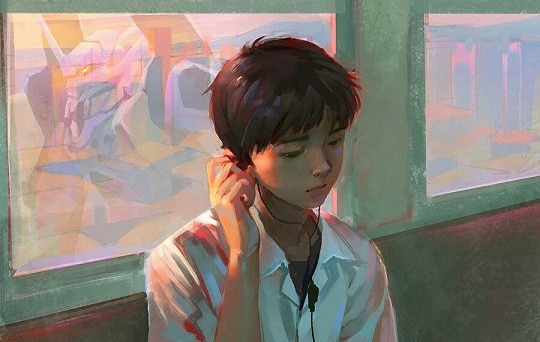
The kids aren’t alright. They didn't know. Evangelion is a work of art, but it was also created by a crazy person who lost his mom, fell into a deep, suicidal, depression, and received so much stress from the death threats on an almost constant basis after the tone shift midway through the series, that he quit the show every week. EVA gets super dark, jarringly fast. Like, one episode everyone is happy and there’s picnics. The next, Shinji is murdering his friend by proxy Dummy System and having the most uncomfortable meltdown ever set to animation cell. That sh*t is wild to witness! Neon Genesis Evangelion is not for children. It's not for all of these Gen-Z kids who want a feel good time or some lofty, idealized, escapism. They were not ready for this sh*t. Not at all. We live in a world of lighthearted, isekai, fantasy, every season. Good time shonen sh*t like HeroAca dominates the popularity charts. They tug at the heartstrings occasionally but The worst thing most of these youngsters have ever seen is f*cking Attack on Titan. EVA is not that. Eva is so much more than that. EVA is SO much WORSE than that...

I think the dissent within the community about my favorite anime stems from the discrepancies between the original dubs and what Netflix has created. This new version feels a lot like a modern anime in a sense; the way it’s scripted and delivered. The way it presents these events. The thing is, though, EVA ain’t modern. It came out in the heyday of otaku culture, long after the Japanese real estate bubble popped and the recession was set in nice and heavy. During this time, there were no prospects, just despair, and EVA reflects that. You can't sanitize an apt depiction of depression, for a generation who confuses the inability to speak to the checkout clerk as a clinical anxiety disorder, by just rewriting a script. That doesn't work. It alienates the tone and message of the entire show. What you're seeing doesn't jive with what you're hearing and it comes across as disingenuous. At it’s core, EVA represents that feeling of helplessness in the same way that the original Gojira encapsulates and anthropomorphizes the national pain of the atomic bomb atrocity. You can't gloss over something like that with an SJW brush and keep the same emotion about all of it. I think that’s why EVA is so brilliant; it captured societal lightning in a bottle. In a world dominated by Japanese technology and the 90s recession just whispered about by the adults, kids these days don’t understand the utterly somber, borderline ominous tone, of what Evangelion represents.

EVA is a character study of broken people; One man’s attempt to compartmentalize the failing of the world around him. It’s a profound thesis on the Bad End, and kids these days, with all of their participation trophies and gold stars and snowflake mentality, can’t accept it. The concept of those type of hard times are foreign to them. They hate EVA because it doesn’t represent their understanding of how life is, or more aptly, was, back then. The current anime community simply can't comprehend that this is a snapshot of one of the most harrowing times for the anime industry and Japan, as a whole. They have no context for that sh*t and misconstrue their ignorance for disdain. The kids have been spoiled for a very long time and Evangelion challenges that entitled notion, something these young Millennials and burgeoning Gen-Zs absolutely hate. I think, though, in time, as the kids mature, their appreciation for EVA will grow. The more of life they live, the more of an understanding they’ll gain about somber the brilliance of this show.

We can’t always be whisked away to a brand new world where we’re the best thing around and people fall all over themselves to be a part of out harem. Sometimes, sh*t sucks. Sometimes it sucks for a long time. Sometimes we just need to get in the f*cking robot.
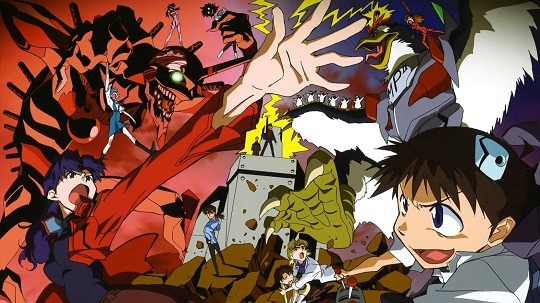
0 notes
Note
Hey Rontra. Sorry is this is too personal, but I was recently diagnosed with autism (high functioning) and even though it didn't tell me anything new per se, I've been trying to wrap my mind around it. Do you have any tips for getting through the transition period?
Hi there friend!Omg yeah getting th diagnosis can be super weird even if it’s not necessarily new information, I totally get what you mean lmao
Even tho it’s personal I don’t rly mind talking about it at all; just remember that this is a suuuuper individual experience and you might not relate to my thoughts on it at all–and that’s okay! I’m happy that you decided to ask for advice, but if mine doesn’t apply to you, that’s okay–and I’m sure there’s other posts out there that can add to this you might relate to more (but I’m on mobile so sadly can’t help much there djfhshs sorry). This kind of advice is hard because everyone’s so different xD ahhhhSpoilers: my tips are very mushy and sentimental ;9
But this DID get long so I’m gonna cut the post fbdbdhdhhs I’m very chatty ;v;
So for context’s sake: I was also diagnosed with autism relatively recently–at 20 years old (am 21 now). While I don’t know how old you are, I’ll assume that you’re an adult or close to it as well–which to me made the diagnosis feel really weird and time-displaced! Like I wasn’t “supposed” to be diagnosed so late, bc it’s “supposed” to be noticed in childhood and thus I’m somehow not “allowed” to relate with other autistic people (obviously, that’s not a correct line of thinking). I felt like, even though it totally makes sense and it’s def the appropriate diagnosis for me, it was weird–definitely difficult to sort of keep up and get my head around it. Everything in hindsight of my life makes 100% sense through this lens, and yet, it felt surreal. Not WRONG; but it was complex.
I think a lot of that stemmed from those two decades of suppressing the traits associated with my autism; things like downplaying or ignoring hypo- and hypersensitive sensory experiences, actively suppressing stims, and expending 90% of my day-to-day energy on just trying to slip “under the radar” in social interaction(let alone do well at it, God forbid). It wasn’t something I did out of conscious self loathing or anything like that; I actually assumed everyone grew up this way, and the world was just supposed to be a fuckin incomprehensible mess of unpleasant sounds and obscure subliminal social cues that people drop just for fun and sometimes things just swirl together into a big mess and you can’t focus and you can’t talk and this is just how the world IS. That we all grow up feeling like aliens and we’re all just pretending. That specific feeling wore off as I grew older and more prone to feeling directly isolated (so now IM the only alien), but the idea that “the world just Is Like This” stuck. It was HUGE to me when I realized that neurotypical people don’t usually relate to that mess. And, more importantly, that all this time-and-energy-consuming self-discipline was suddenly unnecessary, because those things had a reason and they had a meaning and they were mine. That’s weird. It’s good but it’s weird. To take in that those things have patterns and explanations and other people feel them too is overwhelming and beautiful and weird.
It’s weird as hell to feel like some kind of spy in a foreign country trying to blend in with a culture you don’t understand for 20 years, or some kinda alien, an animal in a cage doing tricks for a faceless crowd, only to have that moment where–it’s OKAY and things MAKE SENSE. It’s mine and it’s good and i don’t have to work so hard to be “like them” because I’m not. I can’t be.
I can’t be! Even when people call me (and you) things like “high functioning” it’s measuring my ability to be “like them”–which is something I can’t be. It’s measuring how I function compared to a neurotypical person, and it feels moot, because I’m NOT. It’s a measure of how good I am at pretending to be neurotypical. And guess what: after 20 years, I’m pretty damn good at it! :p
It makes sense, but it’s scary. Because I can finally get to know me, the autistic person–the person I’ve been subconsciously smothering for 20 years. That’s scary, and exciting, and comforting, all at once.
So after all that rambling, here’s one tip: lean into that. Hard. Indulge in something that makes you go “wow, this is pretty autistic” (whatever that might entail for YOU; I get really into obnoxiously elaborate organization systems for my hobby supplies, as one example) and just…let yourself enjoy it. Try a bunch of stim toys if you haven’t had the chance. Find a friend who has an hour or five to spare and tell them about your special interest, if you have one. Explore how you feel when you’re treating yourself to this kind of thing. Feel it all the way through. Take your time to get to know it.
I didn’t really go out and do research and look up more than I already knew–I focused way more on what I was feeling and how this new set of facts interwove with that, that it all made sense and for the first time I was in control of that and could indulge it consciously in a very pleasant way. I am more at peace than I have been in a long time because I’m expending less energy suppressing myself, while simultaneously spending more time being gentle to myself and indulging those autistic traits to bring an overall soothing. I think reviewing your own history and figuring out what makes your autism tick is super helpful in making you comfortable with it–finding what things appeal to you and utilizing those tools fully with the “armor” of your diagnosis. Before, I was often worried because “other people don’t do this” or “doing that is weird”–now, I do these things (stimming, accommodating for my sensory needs, etc) without feeling as bashful about it, because I know now that this is part of my experience with autism. I have that word, I have this diagnosis, and I can use that as my shield against those 20 years of pressure and shame. And if someone thinks my stim or my avoidance of certain touch IS weird–well, that’s their problem, lmfao. I spent 20 years suffering; I’m going to take full advantage of this new flourishing beauty.
To me, this experience isn’t about learning something new (as you said; it’s not new information)–but leaning into it and embracing what was there from the start. If you’re like me and have spent most of your life suppressing these things, indulging them may help you transition through the “whoa” into the “this is good” :p leaning into it HARD was def one of the best things I did hahahaha
another thing I did a lot was just reflection–I’ve spent a lot of time going over my own behaviors, reflecting on the past through this new lens, that kind of thing. I’ve been exploring my own mindset and how my brain works all over again, and connecting the dots to my diagnosis like some huge constellation chart, and it’s one of the most soothing things I’ve ever done. Maybe it’s because I’m big on organization :p Just kind of training myself to apply this new sexy word to it was important to me. To be able to say “oh, I do this thing because autism” or “hey I’m autistic too” and use these terms in a real way helped make the diagnosis and how it applies to me “real” to me as well.
People (neurotypical people, that is) talk to me about “acceptance” and “coming to terms with” and such–and they’re saying the right words but they don’t mean the right thing. They say it like I feel bad about autism. They’re saying it like autism is bad. It’s not. This wasn’t a difficult diagnosis to get–its not really one i struggled to cope with receiving. But they’re right that it is about acceptance, and it is about coming to terms–it’s just a far gentler thing with a different emotional starting point. I was learning from scratch how to take care of myself, with a whole new box of tools and terms to help me; it was flourishing, it was thriving. It was not a scary new disease or some threatening Autism $peaks rhetoric; it was merely understanding, and accepting, and giving myself positive things I’ve been keeping away for too many years.
Step 1 to managing my difficulties is understanding them. Step 2 is being kind.
Upon receiving this diagnosis, things may simply seem to make a lot of sense. Maybe you don’t really feel like it’s a “big deal” the way people around you seem to. It might just be that perfect moment when a puzzle piece clicks into place and it was always meant to be there. That dissonance between other people’s behavior and how you feel might be confusing too (I had this!).
Now, you probably understand things in a new light. It’s a good thing to become closer with yourself. Be nice to yourself and explore your experience of the world with a new light–you don’t necessarily have to do anything huge with that new info, but acknowledging it and naming its root and learning to use it to be kind to yourself in the future is cool. Don’t pretend like it isn’t there; name it, in your head, when you notice a trait in yourself that stems from it. Let yourself know what those things are and what they come from, and make adjustments where necessary to accommodate them. Be kind to yourself and don’t worry.
It’s good. You are good. You have always been good. Thank you.
17 notes
·
View notes
Text
The Things Brands Do on Social Media That People Hate
Outrage is the fastest-spreading emotion on social media, according to multiple studies. People love to hate, and they’ll happily hate your brand if you give them the right reason.
Whether you see a raging firestorm of hostile tweets as free marketing or a living nightmare, this post is for you. Turns out there are endless ways for a brand to stumble across the line into irritating, phony or outright offensive behaviour.
Here are our some of our favourite ways to annoy and alienate your followers…
Bonus: Get the step-by-step social media strategy guide with pro tips on how to grow your social media presence.
14 things brands do on social media that people hate
1. Oblivious self-promotion
Yes, brands are on social media to sell. Your audience isn’t going to hold it against you, for the most part. Unless you just won’t stop selling.
Not everything is about you, Cinnabon.
When you’re building your social media calendar try to follow the 80/20 rule: eighty percent useful (i.e., informative, entertaining, awe-inspiring, etc.) versus twenty percent promotional.
Or, another way of thinking about it: your audience is composed of human beings with thoughts and feelings.
2. Too much AI
Speaking of human beings, consider talking like one, too.
According to Pew Research, 66 percent of Americans have heard of social media bots, and 80 percent of those people think bots are bad.
If you’re considering automating your social media—whether it’s a customer service chatbot or a pay-for-Instagram-followers service—take a moment to consider how badly it could go.
Unless a booking assistant bot is actually faster and more convenient than the alternative methods, don’t risk annoying your potential customers.
Even more problematic: using a bot to automate your social media interactions (eg., retweeting certain hashtags or following/retweeting certain users).
Remember when the Patriots’ Twitter account managed to automatically post this image?
Maintain a human touch on social.
3. Non-apologies
Whether you’ve inconvenienced one person or offended millions, take the situation as seriously as they do.
This apology from the Patriots apparently looked fine to the people who approved it, but it missed the mark for two reasons:
A) it dodges blame,
B) the language is inadequate given the offense.
Some key ingredients of a good apology:
Accept responsibility
Acknowledge the other person’s feelings
Don’t make excuses
Commit to being better
Try not to speak like a character from Kafka’s The Trial
4. Not listening
Social media is not a billboard campaign. When you’re crafting every post with the goal of actively encouraging engagement, at some point you’re going to receive less-than-positive feedback.
Don’t ignore complaints. Not responding to negative feedback is its own crystal-clear response. Not only can your audience see you cold-shouldering other customers, you’re missing out on an opportunity to transform the situation into a positive experience.
What’s the best way to get fewer complaints? Learn from the ones you do get.
People aren’t shy about telling you what needs to change. To that end, a social listening strategy can help you gauge customer mood across social media platforms, and act on it.
5. Thirsty customer service
Yes, brands need to listen. On the other hand, they need to avoid being creepy and invasive. In other words: if you are a chicken restaurant don’t flirt with people.
Sixty-four percent of customers only want a brand to chime in when they’re being directly addressed. It’s a double standard, but if people are out there talking you up it can be weird if you start chatting back.
6. Automatic cross-posting
Nothing says “I don’t care about this platform or the people who use it” more clearly than a post that was clearly meant for another platform.
This tweet is a perfect example of ineffective cross-posting. Twitter users are never going to click through to see an image on Instagram. (I mean, the load times!) And why would anyone say “link in bio” on Twitter, when you can easily post a link?
At best this tweet looks lazy, at worst incompetent.
Craft a new post for each platform. This isn’t a huge task, it just means small tweaks to caption length, image format, and vocabulary. It’s arguably easier than getting your apostrophes right.
7. Posting clickbait
“The best way to convert a potential customer is by misleading them right off the bat,” said no one, ever.
Yes we love clicks. But there’s a difference between compulsive, mindless traffic and a person who has been encouraged to take the first step in initiating a valuable relationship for both parties.
If you’re exploiting your audience’s lizard-brain to draw them in, they’ll figure it out sooner or later. Probably in micro-seconds. Probably even as they click the link they’re already annoyed at themselves (for falling for it) and you (for making them fall for it.)
This is just not how trust is built.
8. Posting engagement bait
One fraction of a step above clickbait (and still on Facebook’s radar as a spammy practice that the algorithm will seek out and punish) is engagement bait.
Bonus: Get the step-by-step social media strategy guide with pro tips on how to grow your social media presence.
Get the free guide right now! Source: Facebook
Begging for comments, shares, likes, reactions, or votes on any platform is honestly a little embarrassing. Your brand is above this kind of behavior.
There are better ways to encourage engagement, like running an above-board Instagram contest.
9. Acting cool
Ok, this one’s a little tougher.
Yes, some brands have managed to win hearts and minds with snark and weirdness. And some brands have managed to fail utterly:
As @BrandsSayingBAE’s bio states: “It’s cool when a corporation tweets like a teenager. It makes me want to buy the corporation’s products.”
Corporations may be people in the eyes of the law, but having a personality is not a commitment to take on lightly if you’re a brand.
It’s the internet. Someone will always find a way to mock you.
On the other hand, people will mock you if you’re boring, too.
10. Being boring
Dr Pepper Snapple act very serious online, considering they’re a group of people who call themselves “Dr Pepper Snapple.”
In 2017 they were so committed to being boring that they got a Twitter account called @OfficialRCCola shut down. The account had posted several viral tweets and attracted 10,000 followers in two months with its irreverent (and markedly anti-Trump) jokes.
Apparently, Dr Pepper Snapple would prefer to receive zero attention on social media. (Their Twitter account is almost entirely inactive except for the odd verbatim press release.)
Here’s a question for brand experts: at what point does their lack of annoyingness become, in itself, annoying?
11. Using emojis when you don’t know how to use emojis
Remember #ChevyGoesEmoji? Probably not. No one does, except for the poor auto journalists who received the company’s all-emoji press release in advance of the Chevy Cruze.
Turns out that for brands, emojis are a privilege, not a right. Learn how to use emoji in your social media strategy effectively, or spare yourself the embarrassment and don’t use them at all.
Not only was Chevy’s emoji use incomprehensible, the branded hashtag was a non-starter, too. Which brings us to our next point.
12. Using hashtags when you don’t know how to use hashtags
It is actually quite difficult to use hashtags without being just a little, um, basic. Using them in an interesting, smart, effective way? Extremely difficult.
For every successful branded hashtag campaign (brb googling “successful branded hashtag campaign”), there are a dozen self-owning fails: #McDstories #susanalbumparty #loveDP
Over the past few years, most brands have learned, often by watching other brands crash and burn, to back off on the kind of hashtags that will open up a floodgate of mockery and shame.
On most social media platforms—and Twitter especially, where humour and vitriol go hand in hand—hashtags require an expert hand.
For instance, using hashtags on Instagram in 2018 is very different than using them on LinkedIn, where they were only introduced this year.
Please. Don’t wing it.
13. Being fake
Remember 2013, when the concept of influencer marketing was understood as: a secret cabal of genius psychopath millennials who, for the right price, could make your single chart or your sparkling beverage popular?
These days audiences are more aware of (and resigned to) the fact that every shout-out is bought and paid for.
That said, if you’re going to “partner” with a celebrity for an endorsement, help your audience maintain their fantasy of independent thought.
Authenticity may be the most overused buzzword of the decade, but the concept still requires respect. Once you’ve lost it, it’s not easy to get back.
14. Being tone-deaf
The last point on our list is maybe the most difficult to get right.
According to a Edelman, in 2018 two out of three people identified as belief-driven buyers, meaning they will buy or boycott a brand based on its stance on controversial issues. (That’s 64 percent of people surveyed, which is a 13-point lift from 2017.)
Audiences are holding brands to a higher moral standard than ever before, which means brands aren’t choosing whether to engage, but how.
Risk-averse brands are naturally going to want to avoid the rampant polarization that clouds today’s political conversation. No shame there: check out these twelve ways to promote your “boring” brand.
It’s arguably a better choice than option two: going the faux-woke route and risking a Kendall “Pepsi” Jenner situation: a 21,000 percent increase in mentions over two days, most of them negative.
Meanwhile, there’s a third option: participating in conversations in a meaningful, unambiguous way. This is still going to earn criticism, but since 53 percent of people believe brands can do more to solve social ills than government can, it can also earn admiration.
Like we said at the top, outrage is the most viral emotion on social media. Nike’s genius here is repurposing the pre-existing outrage over Colin Kaepernick’s blacklisting by the NFL (which, in turn, was because of his outrage over police brutality and white supremacy).
Of course, the key is to ride the outrage, not generate it.
Use Hootsuite to avoid making your social media followers hate you. Compose, publish, and schedule posts in advance, engage your audience in real time, and keep tabs on your competition. Try it free today.
Get Started
The post The Things Brands Do on Social Media That People Hate appeared first on Hootsuite Social Media Management.
This content was originally published here.
0 notes
Text
The Things Brands Do on Social Media That People Hate
Outrage is the fastest-spreading emotion on social media, according to multiple studies. People love to hate, and they’ll happily hate your brand if you give them the right reason.
Whether you see a raging firestorm of hostile tweets as free marketing or a living nightmare, this post is for you. Turns out there are endless ways for a brand to stumble across the line into irritating, phony or outright offensive behaviour.
Here are our some of our favourite ways to annoy and alienate your followers…
Bonus: Get the step-by-step social media strategy guide with pro tips on how to grow your social media presence.
14 things brands do on social media that people hate
1. Oblivious self-promotion
Yes, brands are on social media to sell. Your audience isn’t going to hold it against you, for the most part. Unless you just won’t stop selling.
Not everything is about you, Cinnabon.
When you’re building your social media calendar try to follow the 80/20 rule: eighty percent useful (i.e., informative, entertaining, awe-inspiring, etc.) versus twenty percent promotional.
Or, another way of thinking about it: your audience is composed of human beings with thoughts and feelings.
2. Too much AI
Speaking of human beings, consider talking like one, too.
According to Pew Research, 66 percent of Americans have heard of social media bots, and 80 percent of those people think bots are bad.
If you’re considering automating your social media—whether it’s a customer service chatbot or a pay-for-Instagram-followers service—take a moment to consider how badly it could go.
Unless a booking assistant bot is actually faster and more convenient than the alternative methods, don’t risk annoying your potential customers.
Even more problematic: using a bot to automate your social media interactions (eg., retweeting certain hashtags or following/retweeting certain users).
Remember when the Patriots’ Twitter account managed to automatically post this image?
Maintain a human touch on social.
3. Non-apologies
Whether you’ve inconvenienced one person or offended millions, take the situation as seriously as they do.
This apology from the Patriots apparently looked fine to the people who approved it, but it missed the mark for two reasons:
A) it dodges blame,
B) the language is inadequate given the offense.
Some key ingredients of a good apology:
Accept responsibility
Acknowledge the other person’s feelings
Don’t make excuses
Commit to being better
Try not to speak like a character from Kafka’s The Trial
4. Not listening
Social media is not a billboard campaign. When you’re crafting every post with the goal of actively encouraging engagement, at some point you’re going to receive less-than-positive feedback.
Don’t ignore complaints. Not responding to negative feedback is its own crystal-clear response. Not only can your audience see you cold-shouldering other customers, you’re missing out on an opportunity to transform the situation into a positive experience.
What’s the best way to get fewer complaints? Learn from the ones you do get.
People aren’t shy about telling you what needs to change. To that end, a social listening strategy can help you gauge customer mood across social media platforms, and act on it.
5. Thirsty customer service
Yes, brands need to listen. On the other hand, they need to avoid being creepy and invasive. In other words: if you are a chicken restaurant don’t flirt with people.
Sixty-four percent of customers only want a brand to chime in when they’re being directly addressed. It’s a double standard, but if people are out there talking you up it can be weird if you start chatting back.
6. Automatic cross-posting
Nothing says “I don’t care about this platform or the people who use it” more clearly than a post that was clearly meant for another platform.
This tweet is a perfect example of ineffective cross-posting. Twitter users are never going to click through to see an image on Instagram. (I mean, the load times!) And why would anyone say “link in bio” on Twitter, when you can easily post a link?
At best this tweet looks lazy, at worst incompetent.
Craft a new post for each platform. This isn’t a huge task, it just means small tweaks to caption length, image format, and vocabulary. It’s arguably easier than getting your apostrophes right.
7. Posting clickbait
“The best way to convert a potential customer is by misleading them right off the bat,” said no one, ever.
Yes we love clicks. But there’s a difference between compulsive, mindless traffic and a person who has been encouraged to take the first step in initiating a valuable relationship for both parties.
If you’re exploiting your audience’s lizard-brain to draw them in, they’ll figure it out sooner or later. Probably in micro-seconds. Probably even as they click the link they’re already annoyed at themselves (for falling for it) and you (for making them fall for it.)
This is just not how trust is built.
8. Posting engagement bait
One fraction of a step above clickbait (and still on Facebook’s radar as a spammy practice that the algorithm will seek out and punish) is engagement bait.
Source: Facebook
Begging for comments, shares, likes, reactions, or votes on any platform is honestly a little embarrassing. Your brand is above this kind of behavior.
There are better ways to encourage engagement, like running an above-board Instagram contest.
9. Acting cool
Ok, this one’s a little tougher.
Yes, some brands have managed to win hearts and minds with snark and weirdness. And some brands have managed to fail utterly:
As @BrandsSayingBAE’s bio states: “It’s cool when a corporation tweets like a teenager. It makes me want to buy the corporation’s products.”
Corporations may be people in the eyes of the law, but having a personality is not a commitment to take on lightly if you’re a brand.
It’s the internet. Someone will always find a way to mock you.
On the other hand, people will mock you if you’re boring, too.
10. Being boring
Dr Pepper Snapple act very serious online, considering they’re a group of people who call themselves “Dr Pepper Snapple.”
In 2017 they were so committed to being boring that they got a Twitter account called @OfficialRCCola shut down. The account had posted several viral tweets and attracted 10,000 followers in two months with its irreverent (and markedly anti-Trump) jokes.
Apparently, Dr Pepper Snapple would prefer to receive zero attention on social media. (Their Twitter account is almost entirely inactive except for the odd verbatim press release.)
Here’s a question for brand experts: at what point does their lack of annoyingness become, in itself, annoying?
11. Using emojis when you don’t know how to use emojis
Remember #ChevyGoesEmoji? Probably not. No one does, except for the poor auto journalists who received the company’s all-emoji press release in advance of the Chevy Cruze.
Turns out that for brands, emojis are a privilege, not a right. Learn how to use emoji in your social media strategy effectively, or spare yourself the embarrassment and don’t use them at all.
Not only was Chevy’s emoji use incomprehensible, the branded hashtag was a non-starter, too. Which brings us to our next point.
12. Using hashtags when you don’t know how to use hashtags
It is actually quite difficult to use hashtags without being just a little, um, basic. Using them in an interesting, smart, effective way? Extremely difficult.
For every successful branded hashtag campaign (brb googling “successful branded hashtag campaign”), there are a dozen self-owning fails: #McDstories #susanalbumparty #loveDP
Over the past few years, most brands have learned, often by watching other brands crash and burn, to back off on the kind of hashtags that will open up a floodgate of mockery and shame.
On most social media platforms—and Twitter especially, where humour and vitriol go hand in hand—hashtags require an expert hand.
For instance, using hashtags on Instagram in 2018 is very different than using them on LinkedIn, where they were only introduced this year.
Please. Don’t wing it.
13. Being fake
Remember 2013, when the concept of influencer marketing was understood as: a secret cabal of genius psychopath millennials who, for the right price, could make your single chart or your sparkling beverage popular?
These days audiences are more aware of (and resigned to) the fact that every shout-out is bought and paid for.
That said, if you’re going to “partner” with a celebrity for an endorsement, help your audience maintain their fantasy of independent thought.
Authenticity may be the most overused buzzword of the decade, but the concept still requires respect. Once you’ve lost it, it’s not easy to get back.
14. Being tone-deaf
The last point on our list is maybe the most difficult to get right.
According to a Edelman, in 2018 two out of three people identified as belief-driven buyers, meaning they will buy or boycott a brand based on its stance on controversial issues. (That’s 64 percent of people surveyed, which is a 13-point lift from 2017.)
Audiences are holding brands to a higher moral standard than ever before, which means brands aren’t choosing whether to engage, but how.
Risk-averse brands are naturally going to want to avoid the rampant polarization that clouds today’s political conversation. No shame there: check out these twelve ways to promote your “boring” brand.
It’s arguably a better choice than option two: going the faux-woke route and risking a Kendall “Pepsi” Jenner situation: a 21,000 percent increase in mentions over two days, most of them negative.
Meanwhile, there’s a third option: participating in conversations in a meaningful, unambiguous way. This is still going to earn criticism, but since 53 percent of people believe brands can do more to solve social ills than government can, it can also earn admiration.
Like we said at the top, outrage is the most viral emotion on social media. Nike’s genius here is repurposing the pre-existing outrage over Colin Kaepernick’s blacklisting by the NFL (which, in turn, was because of his outrage over police brutality and white supremacy).
Of course, the key is to ride the outrage, not generate it.
Use Hootsuite to avoid making your social media followers hate you. Compose, publish, and schedule posts in advance, engage your audience in real time, and keep tabs on your competition. Try it free today.
Get Started
The post The Things Brands Do on Social Media That People Hate appeared first on Hootsuite Social Media Management.
The Things Brands Do on Social Media That People Hate published first on https://getfblike.tumblr.com/
0 notes
Text
The Jump
As a pale white kid (sometimes nicknamed Albino) in deepest, rainiest Wales, it was incredibly common to hear – the word “weird”. On the school yard, at home with brothers and sisters; in a team changing room – if any suggestion was made out of the ordinary, you were “weird”.
“Let’s play CHiPs instead of Dukes of Hazzard!” “No, don’t be weird”.
Wearing a Chelsea football jersey? What’s that weird jersey (they were second division after all, plus you’d never get one in Wales 30 years ago)?
Listening to Hip-Hop instead of Bon Jovi? Weird.
As you grow older – perhaps not immediately wiser, but at least more inquisitive – things which used to be “weird” to all – became the most popular things. Chips (OK, the potato kind always had the upper hand – not the retro cop show). Chelsea (deep, painful, stinging sigh with wincing face). Hip-Hop got bastardised by the charts, but regenerated as all true art forms do. But this is the cycle of life in all its financial trendiness, do we not agree?
So what, during Mental Health Awareness Week 2017 does this word mean in the context of daily life? After all, we have grown in knowledge in the last thirty years, have we not? Kids are far more clued up, are they not? Far more streetwise than our past generations and far more multicultural and scientifically informed, which should enforce understanding, surely. Yet to coin a common adage – “the more I know, the less I understand.” Chelsea being so popular, for instance is one thing I’ll not figure out. Or maybe not accept (*pinches self while still wincing*)
Thirty years ago, any child who had “weird” or irregular behaviour would be told to keep quiet, or sent to the headmaster’s office, or smacked or just ignored. Very, very few people had a grasp on what we now recognise as learning difficulties and how they should be handled. Adults with inexplicable mannerisms or incomprehensible ideas to the wider world were either outcast and ridiculed. Alternatively they became geniuses, working for Apple or Microsoft. Weird how these days, they’re called hipsters.

Japes aside, when we think of the adults who had passed through these many ages without understanding their own conditions because they were simply frowned upon, or cast away into loneliness – now, with today’s insight - we should be the ones questioning our own weirdness, or close-mindedness for not striving to know more about Autism, Asperger’s Syndrome when they occur at early ages, or depression, anxiety and psychological challenges when they occur at any age.
Personally I think it’s not only weird, but should be a flagged occurrence when public figures with access to more personal support or advice than the average Joe choose to ridicule depression on social media as a fallacy, or search for attention. How quickly the jaws of irony will tense and their sharp teeth will bite the arses of those - who decide that a “search for attention” is as measurable as the celebrity they exaggerate for themselves. Not that I’m particularly looking at any sportspeople who have the surname Tate and the first name of Andrew, incidentally. Yet the word “denial” does spring to mind. Along with “medieval” and “pity”.
Besides, denial usually results in a longer road to mental recovery and personal freedom in my experience. Once people actually accept that depression is not the social “lurgy” or the inanely-categorised affliction which “weirdness” used to be – it can be managed as well as possible. What absolutely does need to happen is for governments to regulate mental health as they do physical health, so that if fitness is boosted by fresh air, exercise, a healthy diet and being active, so would mental health be extended by less cost for counselling, medication and crushing fear of discussion. Now, in Australia; based on your health insurance as an average arthritic or stiff-limbed, middle-aged expat (which is almost ten times the cost of car insurance per month), you’d still be paying an out-of-pocket fee of around $120 per session after your benevolent health fund covers the other half of expense in each visit. Which means when your health insurance cover for each year has been exhausted (normally around $1000), you would be paying $250 for a counselling meeting.
Working that out per year, beginning in January - if it were one session a week ongoing for someone who had major trauma after an accident or a loss, or simply a generic diagnosis of depression – by the end of February, you’d need a hefty wage to cover the rest of the year’s counselling sessions. Added to the cost of medication which - purchased on prescription (a $10 administration cost of which needs to be paid for after every 6 repeats) in any high street pharmacy – would be around $18 for 28. Hypothetically, the cost of having a mental health issue in Australia with very limited financial support – can cost around $11,000 per year. People then wonder why the trams around Melbourne’s CBD are always full of “characters”.
This is unsustainable. The health insurance system in Australia is outlandishly indulgent for a government which changes every other year and for many of those whom now fight for jobs, for citizenship and have few civil rights having worked here in specialised industries for years. Yet as usual for shuffling pack parliamentaries whose shelf lives in governments last less than top level sportspeople, it is easy money for the economy.
Awareness; leading to change is what is necessary. Looking around the global sandcastle democracies, stifling knowledge is what media has always done. But things change. Generations change. It would only take a person in power having experienced mental health tribulations – in themselves or a person close to them - to raise awareness in others. But the chain of information won’t be continued if we don’t open our own eyes, or those closed eyes around us by talking about how chemically, naturally, unequivocably human these behavioural imbalances are.
To raise money for mental health awareness (and bowel cancer), I dived last Saturday 7th of October. So far, we have raised $2122. As a first-time fundraiser, I am highly grateful to all donators. It also seems to be just scratching the surface, as I know I could have done more in raising money, so it won’t be the last. If you are able, please donate at www.gofundme.com/mentalhealthandbowelcancer and help jump to a place where people are more clued up, more savvy and less feel weird about visiting a professional about how they feel. The link will remain open for a few weeks to come, so there’s no closure as yet.
Stay weird, people.
0 notes
Text
The Art of Not Knowing
The fear of saying “I don’t know” started long ago. In the past, a person’s ability to gain employment was based on their depth of knowledge and aptitude at a particular trade.[1] Workers received intense training and usually performed an apprenticeship before they were considered a “professional” and respected as such. Saying the words, “I don’t know” was an indictment of incompetence.
But the work landscape has changed.
In today’s workforce, having in depth expertise is less valuable and has become a distant second behind potential. A person’s potential and capacity to learn is more important and far more valuable than encyclopedic knowledge on a particular topic.
The Beauty of Not Knowing
The birth of the internet created a huge shift in the information paradigm. Now, information, data and knowledge are literally at your finger tips. The impact of the information sharing on every level and subject, which is readily available 24/7, is a remarkably wonderful double-edged sword.
Things that were privy only to certain people and shared within closed circles is now accessible to all. If you want to know —you can.
The amount and magnitude of information available is overwhelming and incomprehensible. It has become almost impossible to be a true “subject matter expert.” The paradox is that both everyone and no one is an expert.
The shift in information sharing has also impacted workplace norms. Where it used to be frowned upon and taboo to use the words, “I don’t know” in a professional environment, it now has become acceptable and expected. Today people are hired based on their ability to process information not to memorize it — which is a far more remarkable and better use of the brain.
Our brains have gone from being storage containers to multifaceted microprocessors. Your ability to gather, comprehend, evaluate, synthesize, apply and create new information is your most attractive attribute — not your current knowledge base.[2]
Embracing “I Don’t Know”
The quicker you embrace the fact that you don’t know everything about anything, the better off you and those around you will be. You will unburden yourself of undue stress at work and you shift your brain into a continuous state of learning.
The value in embracing and saying “I don’t know” lets you off the hook and helps reduce all of the misinformation pervading our information system. The truth is, your boss doesn’t care whether or not you can produce information on the spot, he or she is more interested in whether or not you can find the correct information quickly and apply it properly.
Chasing “I don’t know,” with “but I’ll get back to you shortly,” is the recipe for continued growth, humility, and opportunities.
How to Know What You Don’t Know
Now that you understand now knowing everything is totally okay in the workplace, it’s time to understand how to complete the process and close the loop. Not knowing is acceptable; but failure to rectify the knowledge gap is not.
Find out What’s Missing
The first step (after admitting your ignorance on the subject) is to ensure that you understand exactly what information you are being asked to provide.
Nothing is worse than misunderstanding what it is the other person needs and chasing your tail down rabbit holes. Make sure what information you are being asked to gather and synthesize and then find out how it should be presented. This is a simple yet critical first step.
Think Through What You’ve Got
Now comes the part of the process where you gather the necessary information.
Ensure your sources are reliable. Read the information and then put it into two categories: What you know and understand and What you need to know or need to clarify further.
Make a list of concepts that you need to research more in depth. Clearly defining and assessing the information is the first step in critical thinking.
Fill in Knowledge Gaps
Focus your energy on researching the things you don’t know or can’t articulate clearly.
Always work from authoritative and well-known research. Use information from industry experts. Start from an original source such as a research study and then work your way out.
Read the abstract first, then find easier to read blogs, articles, books and videos that are based on this founding research. This will help you understand if the secondary sources are accurate. This will not only assist you in understanding the information but reading “lighter” materials also assists you with finding the vocabulary and other tools (charts, graphs, infographics, videos, podcasts, etc.) that can help you accurately explain the concepts.
Suggest Actions
Once you have and understand the information, create a plan of action.
Your course of action depends on the initial request. If you are being asked to present the information for knowledge only purposes, plan your presentation method accordingly.
If you are being asked to provide a solution or recommend a course of action based on your findings, be sure to use a structured research approach such as the “Five Why’s”. Using a structured research method will assist you in making a logical and researched based decision that has passed multiple tests. It also will assist in catching and mitigating flawed logic which is inherent to any decision making process.
Discuss and Brainstorm
Once you’ve identified a few possible solutions using a systematic approach, talk through your research findings and thought process with someone else — your boss or trusted co-worker. Together you can brainstorm potential solutions or assist each other in finding creative and innovative solutions to the issue.
No matter how thorough you are during your research process, you should always seek the input of others. The only perspective you have — regardless of how much research you do is–yours. Seeking the counsel of others broadens your perspective.
Making “I Don’t Know” Palatable
If saying the words “I don’t know” makes you cringe, here are a few alternatives:
“I don’t have a concrete solution at the moment. Let me gather some information and I’ll get back to you.”
“I don’t want to make a hasty decision that we may regret, please give me a few hours to look into this.”
“This particular situation may warrant a different course of action, I’ll do some research and get back to you by the end of the day.”
These are just examples— modify to fit your communication style and situation. The thing to note is that in each example you make it clear that:
You don’t have an answer.
You are going to research the topic/possible solutions.
You provide an appropriate time frame in which you will provide the information/suggested solution.
This approach allows your boss and colleagues to know that you understand the importance of the issue. It also lets them know that you are reliable and are going to work to find the best possible solution in lieu of handing them a half-baked, under-thought remedy which may do more harm than good. In the end, you actually walk away looking more competent, caring and committed than had you been able to provide an answer immediately.
Not Knowing Doesn’t Make You Impotent
“I don’t know” is a legitimate, acceptable and more importantly— responsible response when you don’t know an answer.
Your credibility doesn’t lie in your ability to provide encyclopedic knowledge on demand. We have the internet for that.
Instead, your credibility lies in your ability to track down, research and synthesize information and provide that information in the proper format to the proper people.
Reference
[1]^Encyclopedia.com: Postindustrial Society[2]^eLearning Industry: Information Processing Basics: How The Brain Processes Information
function footnote_expand_reference_container() { jQuery(“#footnote_references_container”).show(); jQuery(“#footnote_reference_container_collapse_button”).text(“-“); } function footnote_collapse_reference_container() { jQuery(“#footnote_references_container”).hide(); jQuery(“#footnote_reference_container_collapse_button”).text(“+”); } function footnote_expand_collapse_reference_container() { if (jQuery(“#footnote_references_container”).is(“:hidden”)) { footnote_expand_reference_container(); } else { footnote_collapse_reference_container(); } } function footnote_moveToAnchor(p_str_TargetID) { footnote_expand_reference_container(); var l_obj_Target = jQuery(“#” + p_str_TargetID); if(l_obj_Target.length) { jQuery(‘html, body’).animate({ scrollTop: l_obj_Target.offset().top – window.innerHeight/2 }, 1000); } }
The post The Art of Not Knowing appeared first on Lifehack.
from Viral News HQ http://ift.tt/2hqG5we
via Viral News HQ
0 notes